25 June 1992, 33 days after Giovanni Falcone's murder and 24 days before his own murder, Paolo Borsellino unexpectedly makes a dramatic and moving public appearance at Palermo Library, with a speech that comes to be known as "The Days of Judas".
If you don't understand Italian, I have translated Borsellino's words (see below). On 25 June he already knows his destiny. He is fully aware that he is next in line to be assassinated. He has already started to 'distance' himself from his children to 'soften' the shock.
Here we look at events in the 57 days between the deaths of Falcone and Borsellino, including those of 19 July 1992.
DAY 0
On 23 May 1992, just after 6 p.m., Paolo Borsellino is in a barber's shop in Palermo when he receives a call from a colleague informing him of the bomb attack on Giovanni Falcone at Capaci. He rushes home to tell his family and then on to the hospital with his daughter Lucia.
At the hospital, he asks for Falcone and is recognised by the doctors, who usher him to his friend's bedside. His daughter Lucia waits outside the room until, after 15 minutes, he emerges ashen-faced. He hugs Lucia and says, "he died like this, in my arms".
At 9.30 p.m., state broadcaster RAI shows the first pictures from the scene of the attack (this is before the days of 24-hour rolling news). Members of Cosa Nostra in the Ucciardone prison in Palermo celebrate on hearing the news.
DAY 1
At 9 a.m. on Sunday 24 May, the coffins of Giovanni Falcone, Francesca Morvillo, Antonio Montinaro, Rocco Dicillo and Vito Schifani are placed in the courthouse in Palermo for people to pay their respects. Borsellino attends with his colleagues, his wife, son and two daughters.
When representatives of the state arrive, Giovanni Spadolini (acting President, as a new President is being elected), Vincenzo Scotti (Interior Minister) and Claudio Martelli (Justice Minister), the crowds outside hurl abuse at them for failing to protect Falcone.
Roberto Scarpinato, then a junior colleague of Borsellino, recalls that Borsellino waves his hand towards the coffins saying to some of the younger judges, "this is the future that awaits us. You are young and have the right to choose whether to stay or not. I have to stay".
That Sunday afternoon, the day after his lifelong friend was brutally murdered, after paying his respects to him in the morning and before attending his funeral the next day, Paolo Borsellino goes to his office and works on his investigations. He is already concious of the fact that time is short and that it will soon be his turn to be eliminated.
DAY 2
Monday 25 May 1982, the funeral of Giovanni Falcone, Francesca Morvillo, Antonio Montinaro, Rocco Dicillo and Vito Schifani takes place in the church of San Domenico in Palermo. Thousands of people outside hurl abuse and throw coins at politicians arriving for the ceremony. The colleagues of the three police protection officers, carrying their coffins into the church, tell the politicians in the front rows, "you should be ashamed of yourselves, don't come anywhere near these coffins".
The memory everybody in Italy has of that funeral is the speech made by Rosaria Costa, wife of Vito Schifani, one of the police officers killed. Addressing those responsible she says, "I forgive you, but you have to go down on your knees".
After this speech, colleagues of the dead police officers approach the politicians in the front rows, angrily demanding justice. They have to held back by uniformed police protecting the state representatives, many of whom have expressions of genuine fear on their faces.
Despite the tension, the anger, the crush of people, nobody is hurt but the images that Italians see that day are those of a country in crisis, without direction. Journalist Attilio Bolzoni remembers that the last person to leave the church after the funeral is Paolo Borsellino. He later discovers that the reason for this is that Borsellino, a deeply religious man, went to confession.
Borsellino's son, Manfredi, recalls that his father is shaken by the scenes of anger he has seen and refuses to talk to anybody about the funeral at home afterwards. This is unusual for Borsellino, who is normally very communicative with his family, despite being reserved in public. Unlike Borsellino, Falcone had no children. He and Francesca Morvillo, both divorcees, married in 1987. Famous Italian journalist Enzo Biagi recalls, in an article on the day of the funeral, that he once asked if they wanted children and Falcone replied , "you have children, you don't have orphans".
Also on 25 May, while the funeral is taking place, the Italian Parliament is meeting to try and elect a new President of the Republic. This process has been going on since 13 May, with 15 ballots being held, but no candidate has received the necessary majority to be elected. The Christian Democrats have been manouevring to get Giulio Andreotti elected. This uncertainty & institutional void adds to the overwhelming sense of instability & lack of direction in the immediate aftemath of Falcone's murder. The shock of this event and need for unity finally results in the election of Oscar Luigi Scalfaro on the 16th ballot.
The only parties that do not vote for Scalfaro are Lega Nord, Rifondazione Comunista and extreme right-wing MSI. Curiously, on 19 May, Guido Lo Porto, an MSI MP & former school friend of Paolo Borsellino, phones Borsellino to ask if he'd accept their candidature as President. Borsellino bluntly refuses. Nonetheless, 63 MSI parliamentarians vote Borsellino's name as President of the Republic on the 11th ballot on 20 May. Borsellino is angry his refusal has been ignored and even loses his temper with Falcone when the latter jokes about it on the phone.
DAY 3
On 26 May, interviews with Borsellino are published in Italy's two leading newspapers, 'Repubblica' & 'Corriere della Sera'. In these, Borsellino says that Falcone was killed not just for what he had done in the past but also for what he could have done in the future. It is common knowledge by then that Falcone was the leading candidate for the new position as National Antimafia Prosecutor. Moreover, Francesca Morvillo, who was an Appeal Court Judge in Palermo, has also been appointed to a position in the Ministry of Justice in Rome. This meant Falcone would be visiting Palermo much less frequently and, although Cosa Nostra could just as easily have killed him in Rome, it was symbolically important to do it in Palermo to demonstrate their control of the territory and their ability to act with impunity.
DAY 4
On 27 May, Borsellino gives another interview, to state broadcaster RAI, again stressing the importance of Falcone's possible appointment as National Antimafia Prosecutor, or even as Interior Minister (as some political figures proposed), as the motive for his murder. So, why is Borsellino, usually a reserved public figure, so anxious to talk about Falcone's death? Almost certainly because he is afraid that investigations could languish or take the wrong direction and he knows he is next on the list of targets, so time is of the essence.
As if to prove Borsellino's concerns, on the same day, Placido D'Orto, Public Prosecutor in Caltanissetta, responsible for overseeing investigations involving Judges from Palermo (to avoid conflict of interests) reports a serious shortage of staff & resources. Caltanissetta has only two Public Prosecutors. All the other positions are vacant and nobody will apply for them because of the high degree of risk and responsibility involved. D'Orto says "here, it is much worse than Fort Apache".
DAY 5
Next day, 28 May, another public appearance for Borsellino and another chance to talk about Falcone, but with an unexpected & unwelcome twist. The occasion is the presentation in Rome of a book on the mafia by sociologist Pino Arlacchi. Afterwards a press conference is held. Also present are Chief of Police Vincenzo Parisi & Interior Minister Vincenzo Scotti. The previous day, Justice Minister Martelli suggested that applications for the post of National Antimafia Prosecutor be reopened following Falcone's death.
Journalist Giovanni Bianconi asks Borsellino whether he will consider applying if there is the chance. Borsellino hesitates, then simply replies, "let them reopen applications", a neutral response. At this point, Interior Minister Scotti interrupts. Scotti bursts out, "of course he'll apply, he will be our candidate." Borsellino says nothing but realises what the Minister has just done; he has made him a mafia target. A few days later, in a conversation with a Carabiniere he says, "they have tossed a bone to the dogs".
In the days following the Capaci attack, security around Borsellino is tightened. It is already impossibile to park in the vicinity of his flat. Other than the courthouse, the two places he frequents most are the church of Santa Luisa and his mother's flat in via D'Amelio. Parking restrictions are introduced around the church but, despite repeated requests from Borsellino's protection officers, no restrictions are enforced in via D'Amelio, which is a residential street with large numbers of parked cars.
DAY 8
On 31 May, Borsellino writes a letter to Interior Minister Scotti informing him that he will not apply for the job of National Antimafia Prosecutor if it is reopened, leaving it to Scotti whether to reveal the contents of the letter. He only does so after Borsellino's death.
DAY 11
On 3 June, Chief Prosecutor in Palermo, Pietro Giammanco, unexpectedly calls Borsellino asking him to fly to the USA the next day to question Tommaso Buscetta and Francesco Marino Mannoia, who are collaborating with authorities, regarding relations between politicians and mafia. Borsellino has requested several times to take part in this mission but Giammanco has always refused previously. Borsellino books his flight for the following afternoon and the hotel, packs his bags and reads up on the case.
DAY 12
Next day, 4 June, Borsellino arrives home for lunch and sits down at the table. His wife, surprised, asks, "what are you doing? I thought you were leaving today."Not any more", he replies. He says nothing else on the matter anf fails to explain this last minute change of plan.
Also on 4 June, the 'Consiglio Supremo della Magistratura' rejects reopening applications for the position of National Antimafia Prosecutor. Despite this, many politicians continue to press for the government to issue a decree on the matter, but nothing comes of it.
DAY 13
One of Borsellino's colleagues, Antonio Ingroia, recounts that, on Friday 5 June, they attend a dinner in a restaurant in Terrasini, organised by the Carabinieri. Borsellino is tired and gloomy but his spirits gradually improve during the evening. When they have finished eating, the restaurant owner comes across and whispers in Borsellino's ear that the cook would like to meet him. A little embarrassed, Borsellino stands up and shakes the cook's hand. The cook, an elderly man, bursts into tears.
Borsellino puts his arm around the cook and they go out into the garden chatting like old friends in Palermo dialect. Afterwards, returning to Palermo in the car, Borsellino recounts that the cook told him that the honest people of Palermo supported him. Borsellino tells Ingroia it was all he could do to stop himself crying as well, knowing that ordinary people are aware of his plight and back him. From then on, he remembers that dinner as the "cena degli onesti".
DAY 15
On Sunday 7 June, at a ceremony in Milan commemorating Falcone, one of his colleagues, Giuseppe Ayala, reminds everyone that Prime Minister Giulio Andreotti, whose right-hand man in Sicily, Salvo Lima, was killed by Cosa Nostra on 12 March, did not even attend Falcone's funeral.
Andreotti, as mentioned previously, is seeking election as President of the Republic and it is probably the killing of Giovanni Falcone that brings to an end any hopes he has of achieving the highest office of state. Many Parliamentarians who may previously have been prepared to turn a blind eye to Andreotti’s dubious relationship with Cosa Nostra due to political expediency are no longer willing to take the risk following the dramatic bomb attack and the reawakening of public awareness.
DAY 16
On 8 June, Justice Minister Martelli and Interior Minister Scotti announce a government decree toughening the prison régime for mafia inmates and making it unnecessary for witnesses to repeat their testimony in court in multiple related cases, reducing the risk of intimidation. Also on 8 June, the Prosecutor's office in Caltanissetta is strengthened by the arrival of three new judges from Catania and Messina to assist the only two Prosecutors working there in the investigation into Falcone's murder.
DAY 17
On 9 June, Roberto Scarpinato, a junior colleague of Borsellino's, describes the measures introduced by the government as "blood-stained" because, as has happened many times before, measures long under discussion are introduced only after the murder of a prominent figure. Scarpinato also calls for the removal of the Chief of Police in Catania over an incredible delay in providing intelligence that could have prevented the Capaci attack in which Falcone, his wife and police protection officers died.
On Thursday 21 May, the wife of a policeman in Catania was playing around with a device for intercepting mobile phone calls used by her husband. She accidentally intercepts a conversation between two men, speaking in Palermo dialect, in which a bomb attack is discussed. The men say, "we'll blow him up...on the motorway...that way they'll uunderstand who is in charge...he's coming with his wife..." She tells her husband, who immediately notifies police HQ in Catania. Checks are made along the Catania-Messina motorway but nothing is found.
Incredibly, the Chief of Police in Catania only notifies Palermo of this episode on 24 May, the day after the Capaci attack.
DAY 21
On Saturday 13 June, former President Francesco Cossiga, less than a month after the end of his term of office, makes a private visit to Falcone's relatives in Palermo. Before leaving, he has a half hour meeting with Borsellino, which the magistrate notes in his diary.
DAY 28
On 20 June, during a commemoration of Falcone in Genoa, his colleague Giuseppe Ayala reveals that Falcone kept a diary. Some other colleagues confirm this, others refute it. Investigating magistrates in Caltanissetta find no trace of a diary in Falcone's office, home or bag. Falcone's bag, recovered after the bomb attack, only reaches investigators on 27 May, 4 days after the attack. The first to examine the contents are Judges Alberto Di Pisa and Giuseppe Pignatone in Palermo. Pignatone is known for clashing frequently with Falcone.
Alberto Di Pisa is a highly controversial figure. On 17 June, he is transferred to Messina by the Justice Minister, while subject to suspension without pay pending disciplinary proceedings. He is suspected of being the so called "corvo" (crow) of Palermo courthouse. The "corvo" is a nickname given to the author of anonymous letters sent to judges in Palermo in 1989, accusing Falcone of organising the return to Palermo of a 'pentito' Salvatore Contorno in order to kill members of the Corleonesi clan.
Detailed knowledge of workings of the pool evident in the letters lead to the suspicion they are written by a Judge, supported by the fact that police informers call the author the 'corvo' (crow), used in mafia language to refer to judges (because of their black gowns).
Investigations, including taking of fingerprints surreptitiously, lead to identification of Judge Alberto Di Pisa. He is convicted of defamation and sentenced to 18 months' imprisonment. On appeal, however, the fingerprints are held to be spoiled & he is acquitted.
DAY 31
On 23 June, to commemorate one month from the Capaci attack, various demonstrations and events are organised in Palermo. At one of these, in the church of Sant'Ernesto, Borsellino makes a speech in memory of his colleague and friend, Giovanni Falcone. He says that, for Falcone, "the fight against the mafia should not just be about repression, but also a cultural and moral movement, involving everyone, so they get used to the sweet smell of freedom, rather than the stench of moral compromise, indifference...and complicity".
DAY 32
On 24 June, the newspaper "Sole 24 Ore" publishes extracts from Giovanni Falcone's diary from late 1990 & early 1991, illustrating how he was isolated and marginalised by Chief Prosecutor Pietro Giammanco. Falcone gave these extracts to journalist Liana Milella.
On the same day, 'Repubblica' publishes an interview with former Head of the Antimafia Pool, Antonino Caponnetto, in which the judge says that, "...Falcone started to die on 18 January 1988 when the Consiglio Superiore della Magistratura appointed Meli ahead of him..."
DAY 33
25 June 1992 is the day on which the event at Palermo Library takes place, with which this thread opens (see above), but it is also important for a highly controversial reason.
What happens, or doesn't happen, on 25 June 1992, is recounted by Colonel Mario Mori and Capitain Giuseppe De Donno of the Carabinieri on 27 March 1999, when testifying in the third trial regarding Borsellino's murder.
According to Mori & De Donno, on 25 June 1992, Borsellino holds a secret meeting with them at the Carini barracks in Palermo concerning an investigation they were conducting into mafia infiltration of public tenders, which was stalled. The two officers say that Borsellino asks them to reactivate the investigation and carry it forward but reporting directly to him and keeping Chief Prosecutor Pietro Giammanco in the dark. For anybody who knows Borsellino, this seems to be completely out of character. However tense his relationship with Giammanco may be, he is a "man of the institutions". He may not respect an individual occupying a role but he has great respect for the role itself.
Moreover, in Borsellino's grey diary, which he uses to note all his appointments and work-related business, there is no mention of this meeting, just a normal 'day at the office'. Antonio Ingroia says that Borsellino never had much to do with the investigation in question.
Mori and De Donno are convicted, along with General Antonio Subranni, in 2018 for conducting secret negotiations with Cosa Nostra in the aftermath of the Capaci bombing in 1992. These convictions are, however, overturned on appeal in 2021, on the basis that “il fatto non costituisce reato”; in other words the negotiations took place but cannot be considered a criminal offence. Earlier this year, the acquittals were confirmed by the Supreme Court of Cassation but on the basis that “il fatto non susiste”; in other words, there were no negotiations.
Borsellino's wife recounts that a few days before his death, Borsellino arrives home shocked and says, "I've looked the mafia in the face because they've told me that General Subranni has been 'punciutu'. This word refers to an initiation ceremony in which a finger is pricked and blood smeared on a 'santino' (image of a Saint), which is then burnt as the new member holds it reciting "I swear alliegance to Cosa Nostra. May my flesh burn like this santino if I break this oath."
On the evening of 25 June, Borsellino makes his speech at the meeting in Palermo Library. His wife Agnese, watching on TV at home, turns pale as he speaks and says, "what is he saying? If he goes on like this, they'll kill him". She recounts that, after the meeting at the library, her husband changes. He has always found time for his family, despite his work, but now he dedicates himself entirely to work, spending less time at home and appearing tense. Borsellino himself tells close colleagues that he is spending less time with his family to prepare them for the worst, so that his inevitable death will be less of a shock to them.
DAY 34
On 26 June 1992, Borsellino travels to Rome to question Gaspare Mutolo (photo). Mutolo was Totò Riina's driver and entrusted with murders, extortions and kidnappings. In 1974, he was even given the task of kidnapping Silvio Berlusconi, a plan that never comes to fruition.
Mutolo agrees to collaborate with the authorities on condition that he be questioned by Giovanni Falcone, which never happens as Falcone is transferred to the Ministry of Justice. Now he insists on speaking with Borsellino. Chief Prosecutor Giammanco, in another affront to Borsellino, gives the task to others but, as Mutolo refuses to speak to anyone other than Borsellino, Giammanco reluctantly assigns the job to Borsellino’s colleague Aliquò "in coordination with Borsellino". Mutolo agrees to this.
In line with other mafiosi 'pentiti', Mutolo tells Borsellino that he will begin by revealing all the information he has on the internal organisation of Cosa Nostra and only later details of links with politicians and parts of the state. This tactic ensures the person collaborating remains valuable to the authorities, guaranteeing their protection, and avoids the immediate risk of politicians or state actors ordering their elimination. As Mutolo says, it is also a way of protecting judges from the same risk.
DAY 36
On 28 June 1992, when he flies back to Palermo, Borsellino meets Defence Minister Salvo Andò at Rome Fiumicino Airport by chance. Andò asks his opinion on a Carabinieri intelligence report indicating Borsellino, Andò himself and Antonio Di Pietro as mafia targets. Borsellino is shocked; he hasn't been informed.
DAY 37
Chief Prosecutor Giammanco has received a copy of the report but has failed to inform Borsellino. Back in Palermo, the next day, Borsellino goes immediately to Giammanco's office to protest. He is so angry that he injures his hand thumping his fist on Giammanco's desk.
On the same day, Borsellino gives his his last ever TV interview (link below) in which he speaks about his concerns but says he is determined to carry on, even though he is certain that he will pay a very high price. Watch and weep at his dignity.
DAY 38
On 30 June, Borsellino, back in Rome, spends the day in a secret location writing up a statement of the testimony given by Leonardo Messina, with his colleague Vittorio Aliquò and Antonio Manganelli from the Police “Servizio Centrale Operatvo” (SCO).
DAY 39
Below is a photo of the page for 1 July 1992 from Borsellino's grey diary. He uses this diary to note his work appointments and, being a very precise person, his daily expenditure (bar, hotel, phone, newspapers, cigarettes; the sums are in 000s lire).
On 1 July, as well as meetings at SCO, with Carabinieri (C.C.) and the “Direzione Investigativa Antimafia” (DIA), Borsellino spends the day questioning the 'pentito' Gaspare Mutolo, who makes serious allegations against two, according to him corrupt, state officials. These are Domenico Signorino, a magistrate who acted as Public Prosecutor in the Palermo maxi-trial against Cosa Nostra, and Bruno Contrada, an agent of Italian Secret Service SISDE. Mutolo, however, refuses to make a formal statement in this regard.
At a certain point, Borsellino receives a call and tells Mutolo he has to interrupt things as he has to meet National Chief of Police Vincenzo Parisi and the new Interior Minister Nicola Mancino, who has just taken office.
When Borsellino returns, Mutolo sees him perturbed. He is so distracted that he lights a cigarette even though he already has a lit one in his mouth. Mutolo asks him what is wrong. Borsellino replies that he met Bruno Contrada in the company of Vincenzo Parisi.
Contrada speaks to Borsellino saying that if he wants any help in dealing with Mutolo he can contact him. This makes Borsellino extremely suspicious because, as far as he is aware, nobody outside of Palermo courthouse knows that he is questioning Mutolo.
DAY 40
On 2 July, Borsellino is back in Palermo. A stolen car is found parked near the home of former Mayor and antimafia campaigner Leoluca Orlando, setting in motion a bomb alert. It turns out to be a false alarm but adds tension to the already uneasy atmosphere in the city.
Borsellino's diary for 2 July shows he works at his office (PR - Procura della Repubblica) in the morning & in his study at home (C - casa) in the afternoon & evening. He recieves visits, notably from Luca Rossi, a journalist, and Rosaria Schifani, widow of Vito Schifani.
Rossi, who works for 'Corriere della Sera' later recounts that he asks Borsellino why he doesn't want the job as National Antimafia Prosecutor, which Giovanni Falcone was going to take, & the reply is, "what can I coordinate from Rome if nobody is investigating in Palermo?"
Rosaria Schifani, whose husband was one of the police protection officers killed at Capaci, asks the judge for advice on whether she should leave Sicily or not. He tells her to stay because Sicily "diventerà bellissima" ("will become beautiful").
You can see from the diary for 2 July that Borsellino pays for a flight to Frankfurt. This is for a trip, leaving on 6 July, to interrogate a 'pentito', Gioacchino Schembri, imprisoned in Germany (other expenses probably refer to his wife Agnese - Agn. and son Manfredi - Mfd).
DAY 41
The diary page for 3 July 1992 does not show anything particular, just a day at the office (DDA - Direzione Distrettuale Antimafia) but, on this day, Borsellino questions another 'pentito', Vincenzo Calcara. He never notes these sessions in the diary for security reasons.
Calcara has been collaborating for a while and, on the first occasion he is questioned by Borsellino, he reveals he was once given the task of killing Borsellino himself. He asks the judge if he is afraid, to which Borsellino answers, "it's good to die for what you believe in".
Also on 3 July, comments by Borsellino appear in the 'Corriere del Mezzogiorno'. He hypothesises that there is a split in Cosa Nostra between the two bosses, Totò Riina and Bernardo Provenzano, and each side is trying to show its muscles by challenging the state. One side killed Salvo Lima, Giulio Andreotti's right-hand man in Sicily, in March and the other side carried out the Capaci bomb attack against Falcone. The suggestion is that this struggle to show who is strongest could lead to an escalation of violence against the state.
DAY 42
Saturday 4 July 1992, Borsellino's grey diary shows that he attends a ceremony at the courthouse in Marsala. He served as Chief Public Prosecutor there from December 1986 up to March 1992. There wasn't time for a leaving ceremony before, so it is being held now.
Borsellino applies for the job in Marsala as he wants experience in leading and co-ordinating investigations with a group of young enthusiastic magistrates under him. He gets the post even though others have seniority over him because of his antimafia experience. This creates discontent among traditionalists and envy of his fast track career feeds into press rumours and attacks. Notably, an article in "Corriere della Sera" on 10 January 1987, "I professionisti dell'antimafia", by Sicilian intellectual & author Leonardo Sciascia.
Sciascia sees Borsellino's move as an example of arrogance and careerism by flaunting antimafia credentials. Sciascia's position finds more supporters than opponents and marks the start of Falcone's sense of isolation, as Borsellino reveals after Falcone's death. This support encourages Sciascia to continue with his campaign saying that the power of antimafia is "very similar, overall, to the power of the mafia & to the power of fascism" (Giornale di Sicilia) & "in the name of antimafia, a kind of terrorism is used..." (RAI Tg2).
In January 1988, Sciascia apologises to Borsellino, the main target of his article, and the two meet for lunch. Borsellino later says he forgives Sciascia, who he thinks was manipulated & badly informed by others.
After the public event in Marsala courthouse, Borsellino's former colleagues hand him a personal note expressing gratitude for all he taught them, as well as some jokes about his occasional short temper. Borsellino has it framed and hangs it on the wall of his study at home.
DAY 43
Sunday 5 July 1992, Borsellino notes three main places he goes; to mass (he is a deeply religious man); to the house shared by his mother and his sister Rita in via D'Amelio; to his summer house at the beach in Villagrazia di Carini.
Time spent at home, on Sundays or other days, does not mean Borsellino is not working. He gets up at 5 a.m. every day and works in his study. His wife recalls in the final weeks of his life it is impossible to speak to him. He says he has to work and is in a race against time.
DAY 44
On 6 July 1992 Borsellino travels to Mannheim in Germany with colleague Teresa Principato and Lt. Carmelo Canale of the Carabinieri. Their mission is to question a recently arrested mafioso, Gioacchino Schembri, suspected of being one of the killers of Judge Rosario Livatino.
On arrival at Frankfurt airport, they are greeted by eight armour-plated cars and hosts of well armed police guards. In Mannheim the hotel has been turned into a fortress; metal detectors, x-ray machines. Borsellino smiles ironically and says to the others, "just like at home". According to Canale, in the evening, when they eat at a restaurant, Borsellino is relaxed and jokes with his colleagues and the police guards. As his wife once said, he always felt much safer outside Palermo.
DAYS 45 & 46
The days of 7th and 8th July 1992 are dedicated mainly to questioning Gioacchino Schembri, gaining his trust and convincing him to collaborate with investigations. In this Borsellino is successful. When questioning is over, Borsellino asks Schembri how he is treated.
Schembri says he is treated well but he hasn't been able to see his wife for a long time. Borsellino asks the German authorities to let Schembri's wife visit her husband. They are reluctant to do so but, at his insistence, eventua lly give in. This finally convinces Schembri that he can trust Borsellino. When the judge leaves, he places an unopened packet of cigarettes on the table for Schembri, who smiles. Borsellino says, "see you again soon." He never will.
DAY 47
On 9 July, Borsellino returns to Italy. He hopes to meet his daughter Fiammetta at Rome Fiumicino Airport when he lands, as she is leaving for a holiday in Thailand with friends. However, his plane is diverted to Ciampino Airport. They will never see each other again.
In the afternoon, he continues questioning the 'pentito' Leonardo Messina in Rome. For a few hours, Messina talks about murders, mafia wars & links between mafia & masonic lodges. Unexpectedly, after the long interview, Messina asks Borsellino, "can I have an autograph?" Borsellino is dumbfounded, "an autograph?" "It's for my children", says Messina, "they asked me. They see you on TV". When Borsellino returns next day to continue questioning, he brings with him an autographed postcard for Messina's children bearing the dedication, "in memory of long days spent with your father".
DAY 48
Questioning of Leonardo Messina continues on 10 July and, in the evening of that day, Borsellino has dinner with Lt. Carmelo Canale. Canale recounts that the judge seems happy that evening, though disappointed he has missed seeing his daughter Fiammetta.
He chats about his family, his other daughter Lucia, who is studying Pharmacy, and his son Manfredi, who is following in his father's footsteps and studying Law (Manfredi Borsellino later joins the Police & now commands the police station in Mondello).
Also on 10 July, police unions protest that none of the extra bullet-proof vests and armour-plated cars promised for Palermo in the wake of the attack at Capaci have arrived yet.
DAY 49
On Saturday 11 July, Borsellino is still in Rome questioning Messina and taking part in meetings. In the afternoon, he travels to Salerno, where his colleague Diego Cavaliero's son is being christened the next day.
DAY 50
Borsellino shares a hotel room with Carmelo Canale. On waking at 6 a.m. Canale finds Borsellino already up and dressed, intent on writing in his famous personal red diary, which will mysteriously disappear on the day of his assassination. He asks Borsellino what he is doing and the judge replies, "Carmelo, the time for talking is over for me. Too many things have happened in the last few months, now I have things to write ... some of this is for you as well".
DAY 51
On Monday 13 July, Carabinieri of ROS (responsible for investigating terrorism, serious & organised crime) report to the Prosecutors' office and other police forces that confidential sources confirm a consignment of explosives has arrived in Palermo. Borsellino is the likely target.
In the afternoon of 13 July, one of Borsellino's police protection officers, seeing him with a very tense face, asks him if anything is wrong. Borsellino answers, "...I'm worried for you, because I know that the explosives for me have arrived & I don't want to involve you."
DAY 52
Tuesday 14 July 1992, Giacomo Ubaldo Lauro, a member of 'ndrangheta in prison in the Netherlands, informs the Italian Consul a bomb attack against Borsellino is imminent. Rome is informed the same day. News arrives in Palermo on 25 July, six days after Borsellino's murder.
DAY 53
Wednesday 15 July 1992, Borsellino is at work in an almost deserted courthouse. It is the Feast of St. Rosalia & an important holiday in Palermo. In the morning he bumps into his colleague Antonio Ingroia in the corridor. Ingroia tells him he is leaving next day for a week's holiday.Borsellino is disappointed; Ingroia is one of his most trusted colleagues. Ingroia reassures him. It is only a week and in a rented beach house not far from Palermo. He can easily be reached if needed & return quickly but Borsellino keeps up his silent disapproval.
In the afternoon, Borsellino is working in his office when Ingroia knocks on his door. He tells his colleague he'll be back at work early, on Monday, cutting short his holiday. Borsellino smiles, stands up and puts his arm around Ingroia's shoulder as they say goodbye.
Also on Wednesday 15 July 1992, Swiss Judge Carla Del Ponte gives an interview saying she feels under threat and unable to return to Italy. She worked with Falcone and was due to be a guest at his summer house in Addaura on 21 June 1989, when explosives were found on the beach.
DAY 54
Thursday 16 July 1992, Carabinieri in Milan receive a tip-off that bomb attacks are being prepared against Borsellino in Palermo and Di Pietro in Milan. Prosecutors' offices are informed, incredibly, by post. The information arrives in Palermo several days too late.
On this day Borsellino is in Rome and conducts his final interview with Gaspare Mutolo, who agrees to make formal statements on his accusations against Bruno Contrada and Domenico Signorino but, after long hours of questioning, Borsellino puts it off to a later date.
As an aside, concerning Mutolo's accusations against Contrada, in 2007, after an interminable judicial saga (he was arrested on Christmas Eve 1992), Contrada was sentenced to 10 years' imprisonment for participation in a mafia-type organisation.
As concerns the accusations against Judge Domenico Signorino, when these became public his colleagues reacted with incredulity & Signorino told them he was confident of being able to disprove them. However, on 3 December 1992, he committed suicide.
Just before leaving Mutolo, Borsellino receives a call from his daughter Fiammetta, who is on holiday. Mutolo then confides his worries for his own children and the risks they run.Borsellino tells him, "our children's job is to make us worry. The important thing is that they know they are the most precious things in our lives".
DAY 55
At about 9 a.m. on Friday 17 July 1992, a grey Ford Transit van with German Customs number plates stops for fuel at a service station on the A1 Motorway near Florence. The driver, speaking with a strong Palermo accent, chats to the pump attendant about the political situation in Italy as he fills the tank. He ends by saying, "what happened to Falcone is nothing. Something much bigger will happen in a couple of days."
The same day, in the morning, before leaving Rome, Borsellino meets Italian Chief of Police Vincenzo Parisi (photo). On behalf of his police protection officers, concerned for his safety, he makes an official request for extra resources to strengthen his protection. The police protection officers also ask for organisational change to come into effect immediately. However, Borsellino leaves the meeting empty-handed. At 3 p.m. he flies back to Palermo. Before returning home, he passes by the courthouse to lock away his files.
While at the courthouse, Borsellino calls Lt. Carmelo Canale to update him on his questioning of Gaspare Mutolo. Canale has always accompanied him on previous occasions but Chief Prosecutor Giammanco has now prohibited Borsellino from taking anyone with him in future. Canale recounts that Borsellino has a tired embittered voice. Canale suggests he take a break. Borsellino reminds him on Monday they are flying to Germany to continue taking statements from Gioacchino Schembri.
However, he says maybe they can take a break on their return at Asinara island in Sardinia. Asinara is where Borsellino spent a month with Falcone in summer 1985, preparing the maxi-trial, after they'd been spirited out of Palermo due to an imminent threat to their lives.
Before leaving the courthouse Borsellino passes by the offices of each of his colleagues and hugs each one of them in turn. Many of them will remember being shaken by this gesture, highly unusual for such a serious-minded reserved person as Borsellino.
In the car, on the way home from the courthouse, Borsellino calls Giovanni Tinebra, who has recently taken over as Chief Public Prosecutor in Caltanissetta and is, therefore, now leading the investigation into Falcone's murder. The Carabiniere driving the car catches just a few words, "We have finished now. Now the ball is in your court." He says that Borsellino seems "distraught" during and after the phone conversation.
And here we return to the key question in the 57 "days of Judas". How is it possible that investigators cannot find time to interview Falcone's closest friend & colleague, who repeatedly indicates, in private & in public, that he has vital information to share with them?
Borsellino arrives home in the late afternoon. He tells his son Manfredi he is optimistic about Totò Riina being captured soon (Riina is arrested on 15 January 1993) as a new 'pentito' is providing useful information (he doesn't name Mutolo because he can't). Paolo Borsellino is very nervous. He says to his wife, "let's go to Villagrazia (where they have a summer house), I need some air, but on our own, without the protection officers." His wife is surprised but understands his tension & need to talk away from other people.
Borsellino is silent. Only after insistence from his wife does he open up. He tells her that Mutolo has made extremely grave allegations about people who are above all suspicion. Borsellino finds the revelations so traumatic that he vomits at the end of the interview. Borsellino also tells his wife, "Today, Agnese, I looked the mafia in the face." He is deeply perturbed. That day he has been to see the Interior Minister Nicola Mancino. Does he mean the Minister? Did he see someone else at the Ministry, Bruno Contrada, perhaps?
DAY 56
Saturday 18 July 1992. Paolo Borsellino spends the morning working alone in his office at Palermo courthouse. In the afternoon, he goes to his mother's flat in via D'Amelio
Borsellino's friend, Dr. Pietro Di Pasquale, a cardiologist, has promised to come to the house to examine his mother but phones to say he has a problem with his car and can't make it. They agree that Borsellino will accompany his mother to the doctor's house the next day.
In the evening, Borsellino goes for a walk with his wife Agnese on the seafront at Carini. Agnese says, "Paolo told me he wasn't afraid of the mafia, that it wouldn't be the mafia that decided to kill him. It would be his colleagues and others that allowed him to be killed". In other words, it would be the mafia that physically eliminated him but the decision on whether and when to kill him would be taken by elements within the Italian state, not by the mafia.
Borsellino decides that the next day, Sunday 19 July 1992, he won't work but spend the day at the family's beach house before picking up his mother at 5 p.m. It will be his first work-free Sunday for months. He even worked on Sunday 24 May, the day after Falcone was killed.
DAY 57
Sunday 19 July 1992. Paolo Borsellino gets up at 5 a.m. as he does every day. The phone rings. Knowing his habits, his daughter Fiammetta is calling from Thailand, where she is on holiday, to check how things are going.
When the call is over, Borsellino sits at his desk & writes a letter to a teacher from a school in Padova. She has written an angry letter to him because didn't respond to an invitation to visit her school. Borsellino explains that the invitation never reached him. He answers ten questions that her students have asked him & says, "...I'm optimistic because...young Sicilians have a very different attitude to the mafia to the indifference of the past. When they are adults they'll have greater strength to react than my generation did."
At 7 a.m. Paolo Borsellino receives his second phone call of the morning. His wife Agnese is woken by his angry voice and the sound of him slamming down the receiver and gets up to see what is wrong. Borsellino is furious. "Do you know who that was. Giammanco. He says he didn't sleep all night thinking about the responsibility for questioning Mutolo. He has decided to give it entirely to me. He wants to see me tomorrow morning before I go to Germany to sign the papers".
Borsellino has been waiting for this for months but, instead of being pleased, he is livid and paces around the flat. "Do you know what he said. He said now the question is settled. I told him it isn't. Giammanco will have to respond for his behaviour".
Borsellino notices his daughter Lucia is also up & he starts to plan the day. First to the beach house at Villagrazia, then he and Lucia will accompany his mother to the doctor's. Lucia, however, insists on staying home all day as she has an important exam to study for. Not even his son Manfredi wants to go to Villagrazia so early. He was out till late the night before and wants to lie in. He will join his parents later in the morning. Agnese sets off first with a relative, then Paolo Borsellino joins her around 10 a.m.
Borsellino's son Manfredi arrives at Villagrazia around 11 a.m. Outside the house, the police protection officers tell him that his father has gone out in a boat with his friend Vincenzo Barone for a swim. When he returns, the family goes for lunch with neighbours. The neighbours are Pippo and Mariella Tricomi, old family friends. They eat fish and 'panelle e crocchette'. Borsellino confides with Pippo Tricomi, "the explosives for me have arrived". During the meal he receives a call confirming details of his trip to Germany the next day.
After lunch, Borsellino watches that day's stage of the Tour de France on TV, then goes for a lie down. His wife later finds from the butts in the ashtray that, in an hour's 'rest', he smoked five cigarettes.
At 4.30 p.m. Paolo Borsellino returns to the others, puts his papers, his packet of cigarettes and his inseparable red diary into his briefcase, and says goodbye to everyone as he is going to pick up his mother to take her to her doctor's appointment.
Paolo Borsellino is, naturally, accompanied by his team of police protection officers. That day the protection team is composed of six officers from the 'Polizia di Stato', led by Agostino Catalano. Catalano (43) has 3 children. When his wife dies, in 1989, he joins the protection service to earn more money to support his family. Normally, he is assigned to protect Fr. Bartolomeo Sorge. On Sunday 19 July, he is officially on leave but is called up as cover.
Walter Eddie Cosina (30) is born into an Italian family in Australia. His family returns to Trieste and he becomes a police officer. After Falcone's murder, he volunteers for a transfer to Palermo in the protection service. On 19 July he is not on duty but replaces a colleague.
Vincenzo Li Muli (22) is the youngest member of Borsellino's protection team. He has only been a police officer for two years but asks to be assigned to the protection service following Falcone's murder.
Emanuela Loi (24) is from Cagliari (Sardinia). She wants to be a teacher but takes the police entrance exam to help her sister study for it. She passes but her sister doesn't. In Palermo, she is assigned to protect Senator Sergio Mattarella (now President of Italy) before Borsellino. She is the first female police officer to die on active service in Italy.
Claudio Traina (27) is from Palermo. After National Service in the Air Force, he decides to follow his older brother's career in the Police. After a period of service in Milan, he's transferred to his home city. In 1990, he requests assignment to the protection service.
Antonio Vullo (32) is from Palermo and is the only member of Borsellino's protection team that will survive the bomb attack that day in via D'Amelio.
At 16.52, mafioso Giovan Battista Ferrante calls a cellphone number belonging to Cristofaro Cannella, right-hand man to Giuseppe Graviano, from a phone box in Viale della Regione Siciliana, indicating he has seen the three armour-plated cars carrying Borsellino pass by.
Since early morning, Ferrante, Raffaele Ganci, Domenico Ganci, Stefano Ganci, Salvatore Cancemi, Salvatore Biondino, Salvatore Biondo ("il corto"), Salvatore Biondo ("il lungo") & Antonino Galliano have been following Borsellino's moves, waiting for him to visit his mother.
A stolen Fiat 126 with stolen number plates is parked in via D'Amelio in front of the building in which Borsellino's sister Rita lives in a flat with their mother. It has been packed with 90kg of explosives.
Apart from the mafiosi mentioned above, much of the work in preparing the attack has been carried out by Gaspare Spatuzza, Vittorio Tutino, Francesco Tagliavia and Lorenzo Tinnirello.
At 16.58 Borsellino arrives in via D'Amelio, gets out of his car with five of his six protection officers and rings the bell of his mother's flat. At that moment, a remote control is activated, either from behind a wall at the end of the street or from a nearby building site.
The only survivor from the protection team, Antonino Vullo describes the explosion: "the judge and my colleagues had got out of the cars. I was parking the lead car. I didn't see or hear anything suspicious at all. Suddenly, it was an inferno … I saw a huge flash, I felt the car being lifted up. The shockwave threw me out of my seat. I don't even remember getting out of the car. All around me were shreds of human bodies."
The scene after the explosion can accurately be described as carnage. Body parts are found hanging in a tree and on the balconies of upper floors of the building. The explosion is heard all over Palermo and a plume of black smoke hangs over the scene. Chaos ensues, as you can see in the video linked below. Police, Carabinieri, Fire Brigade & Ambulance service vehicles & personnel rush to the scene. Perhaps, other more sinister figures from the Secret Services are also present.
Misdirection & mystification of investigations into this heinous crime begin within minutes of it occurring. After 30 years and four trials, we still don't know the whole truth. Borsellino was treated shamefully before his death & has been ever since.
The most symbolic photo of the immediate aftermath of the via D'Amelio bombing comes to light in 2005. It shows Carabinieri Captain Giovanni Arcangioli walking away from the scene, with cars still burning, carrying Paolo Borsellino's briefcase.
This bag and, most importantly, Borsellino's personal red diary, which was certainly inside as he took it everywhere with him, mysteriously disappear. We can only imagine what kind of information it contained and, almost certainly, we will never know.
When questioned about his actions, Arcangioli says that he was asked by a judge present at the scene, either Giuseppe Ayala or Vittorio Teresi, more probably the former, to look in Borsellino's car and recover the briefcase. He did so and then brought it to the judge. The judge opened the bag but there was nothing of significance, just papers. Arcangioli then gave the bag to one of his men (he doesn't remember who) to put in the judge's car. His story is largely confirmed by his superior Col. Minicucci. Neither of them writes a report.
Ayala gives a different version saying he only briefly held the bag, never opened it and handed it to a Carabinieri officer in uniform, so not Arcangioli. Other police officers on the scene recount that the bag was removed by plain clothes officers with Secret Service badges.
Whenever I think of the via D'Amelio bombing, I always come back to this photo. It was not enough to eliminate Paolo Borsellino physically. By making his red diary disappear, they succeeded in destroying part of his legacy as well.



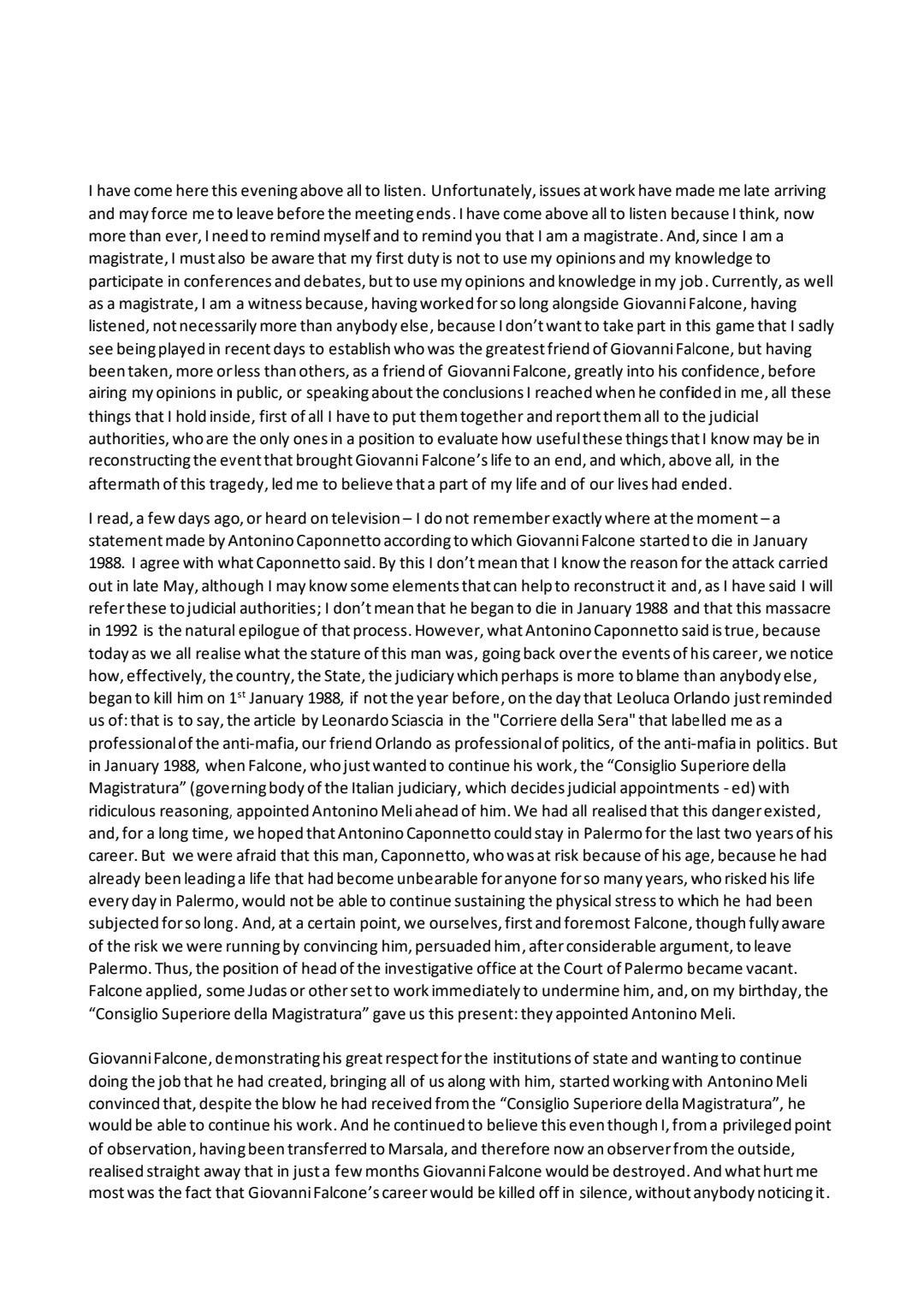
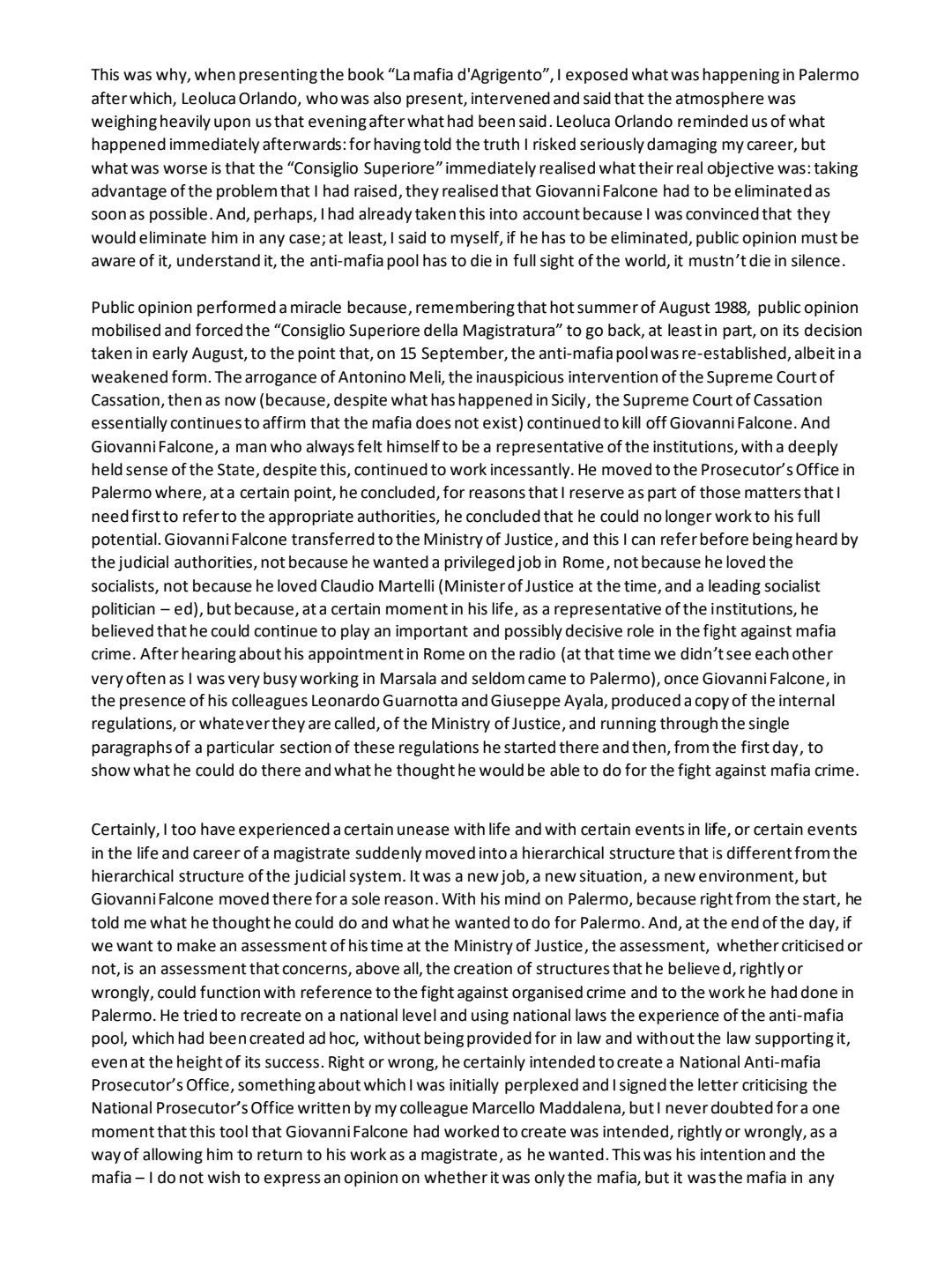
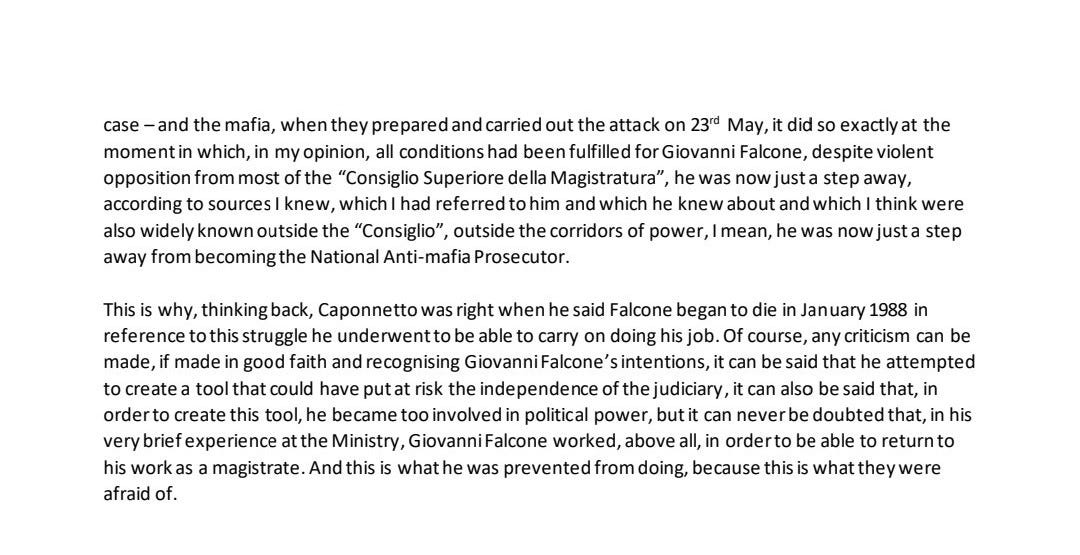
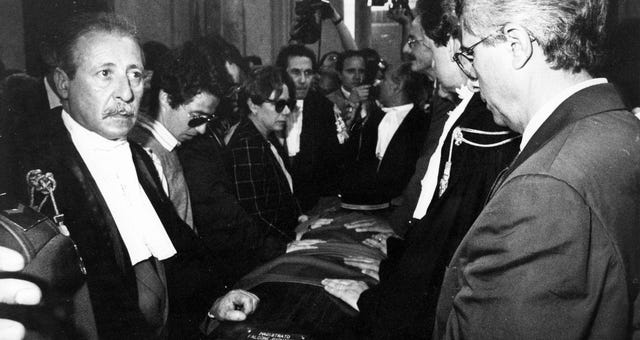
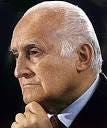
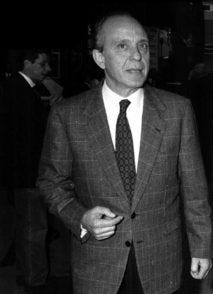
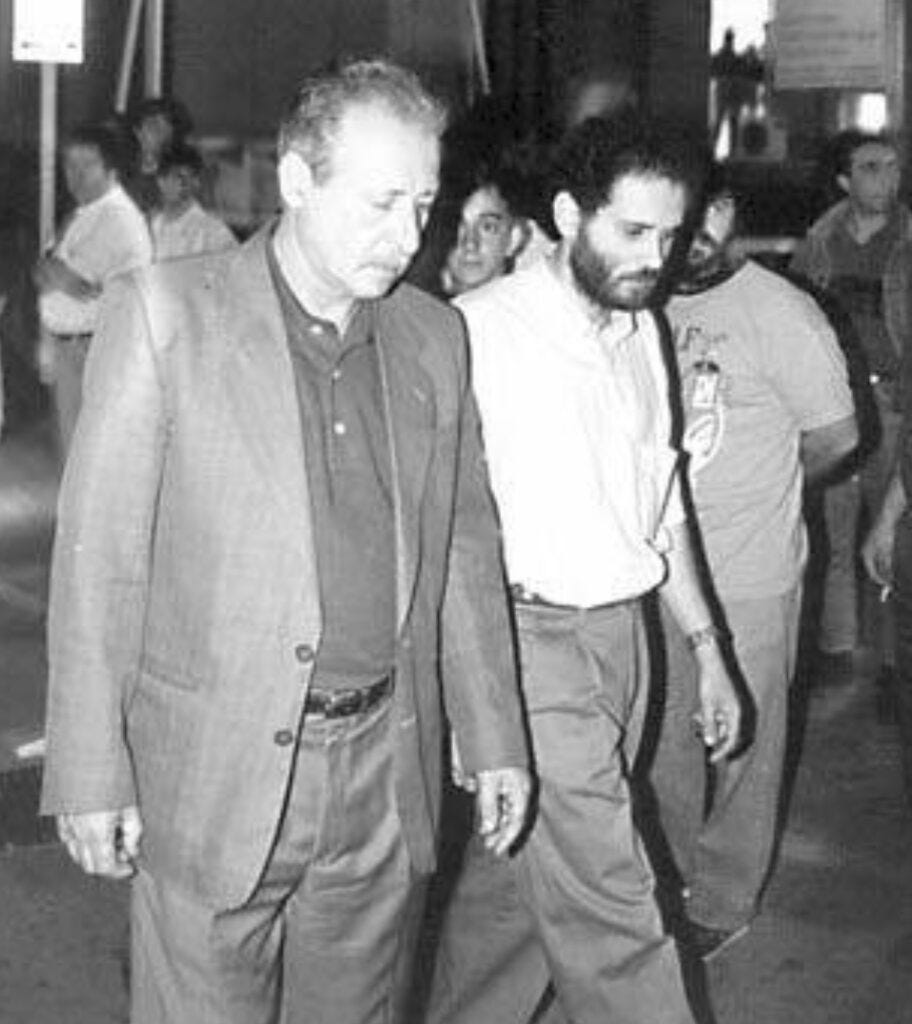
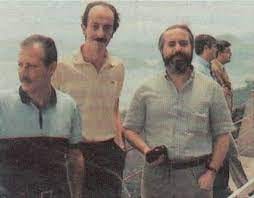
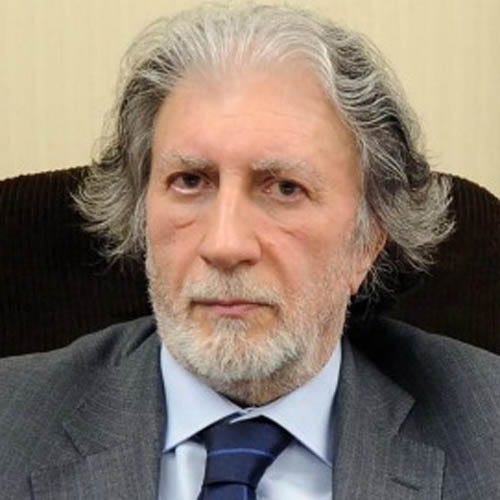
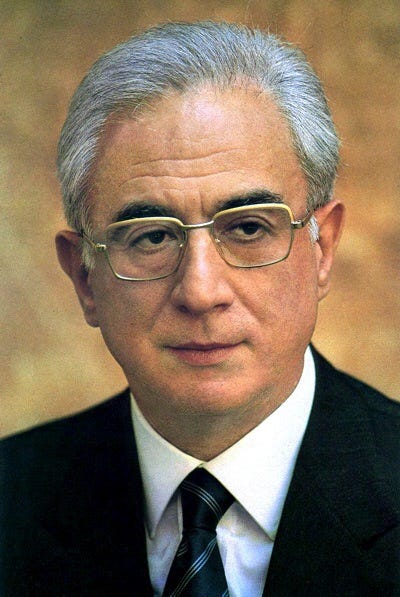
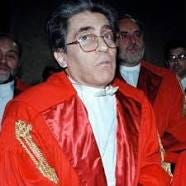
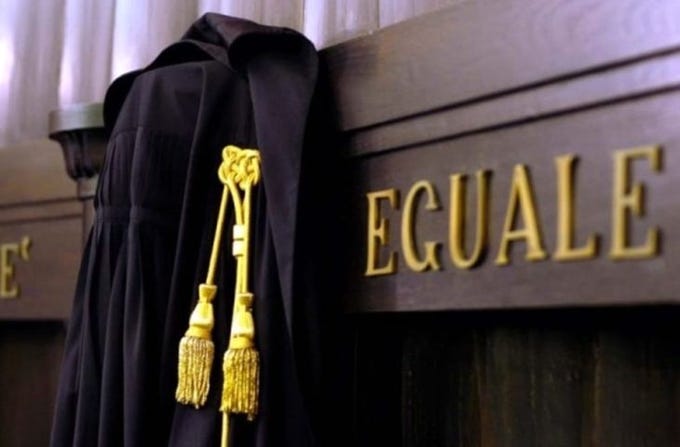
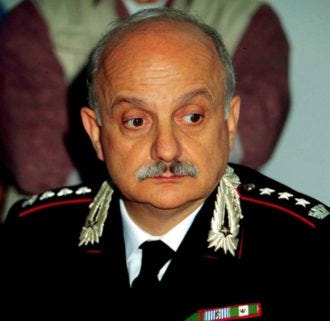
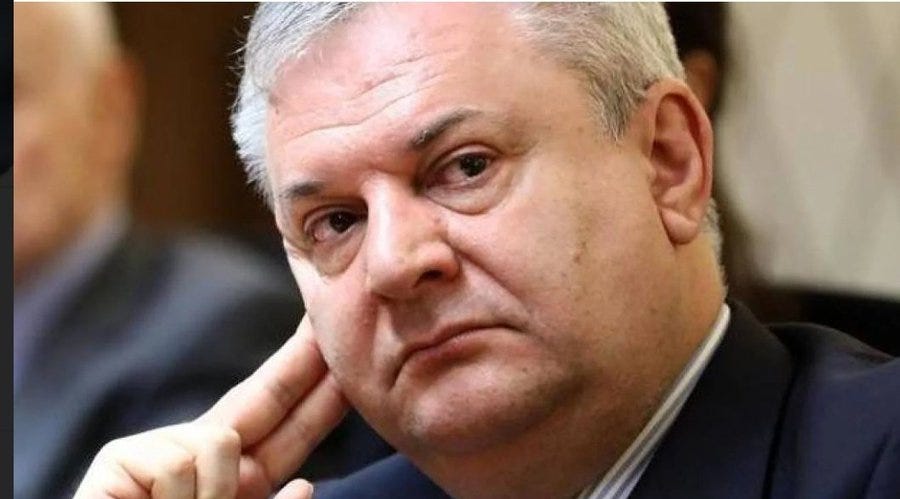
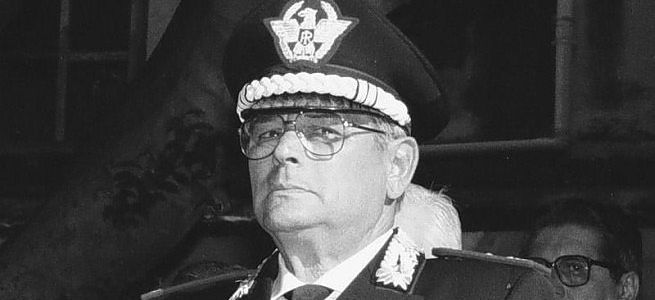
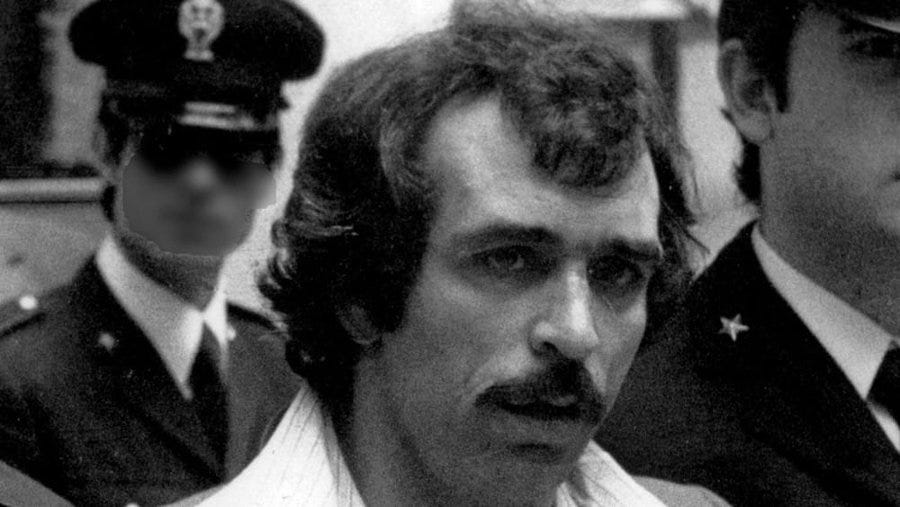
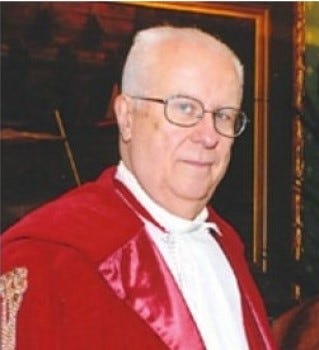
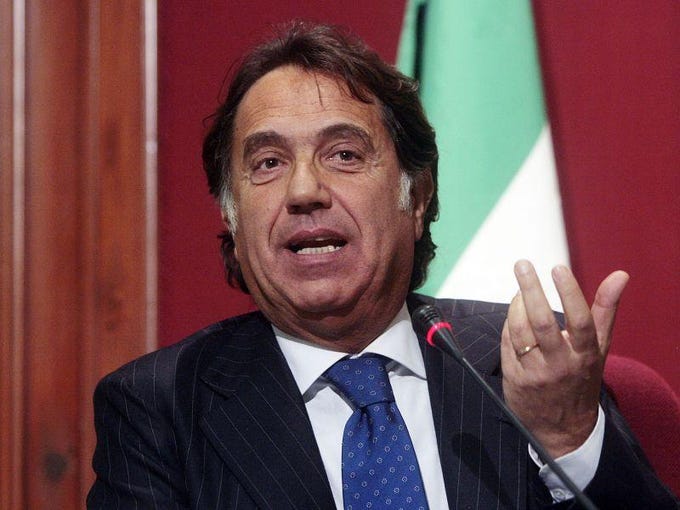
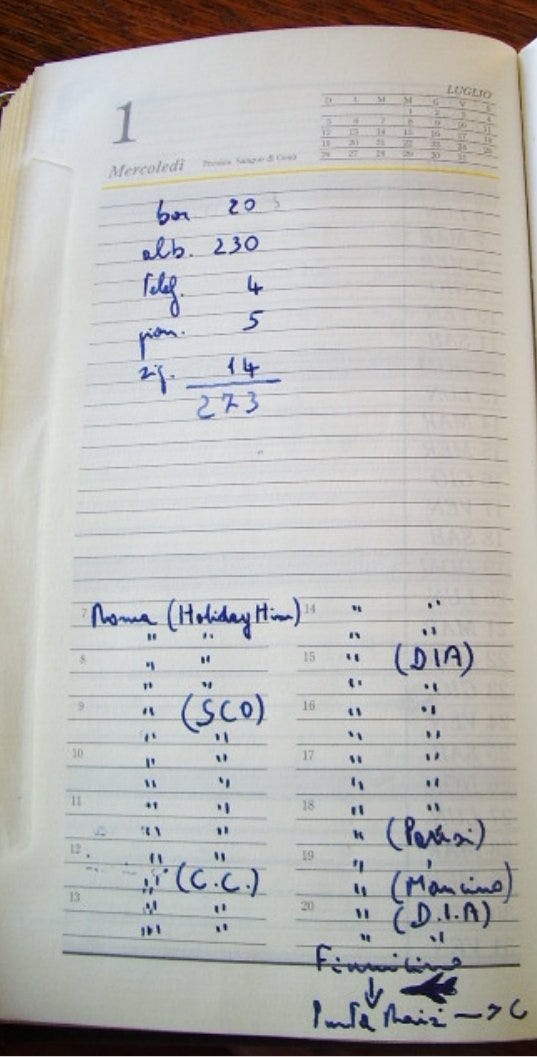
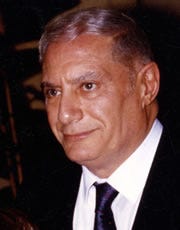
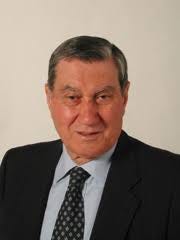
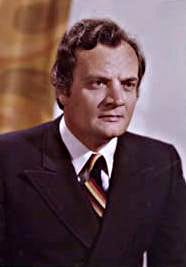
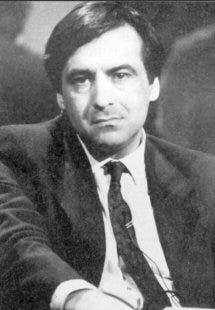
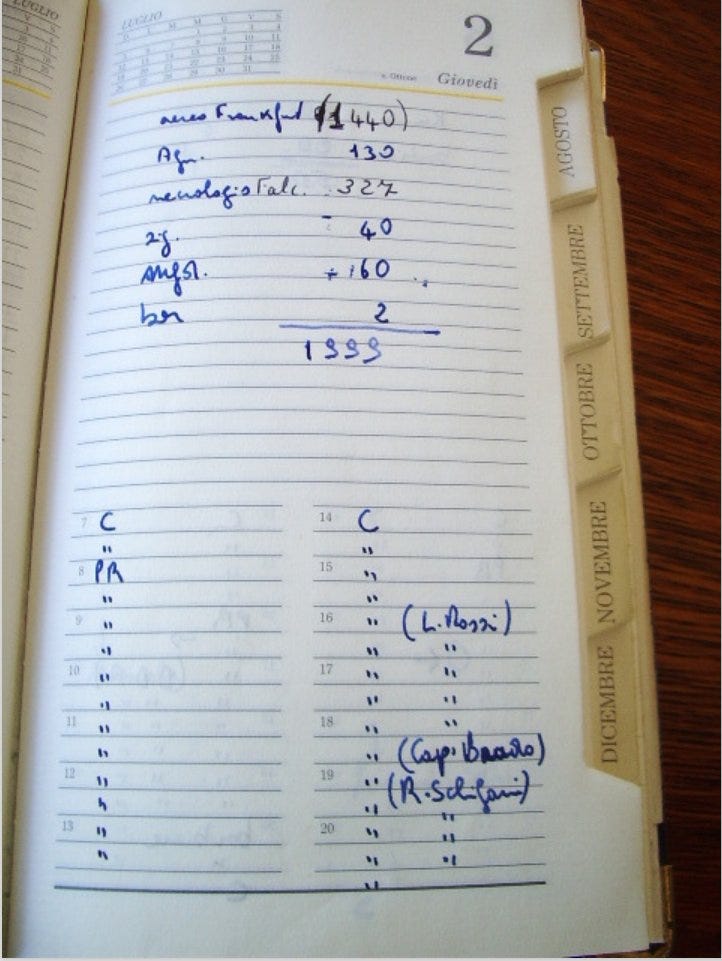
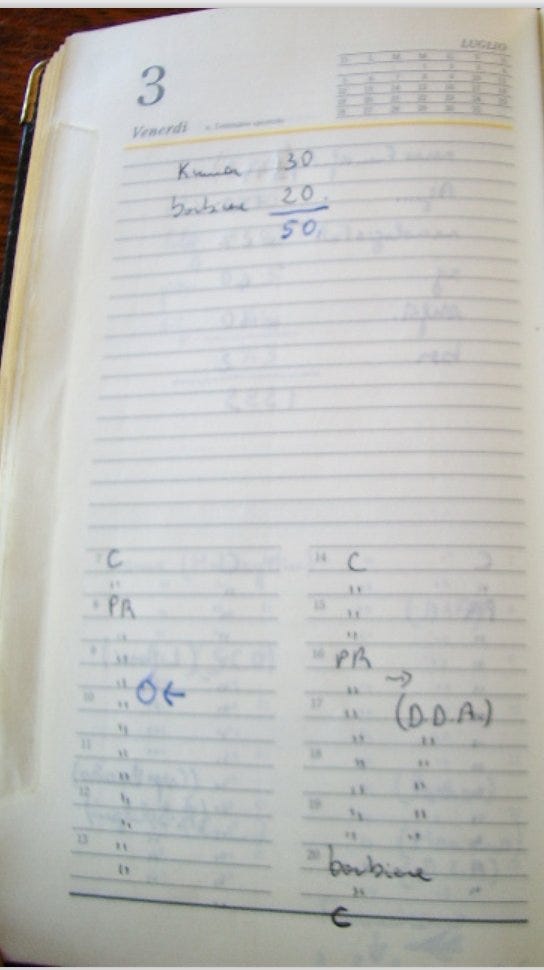
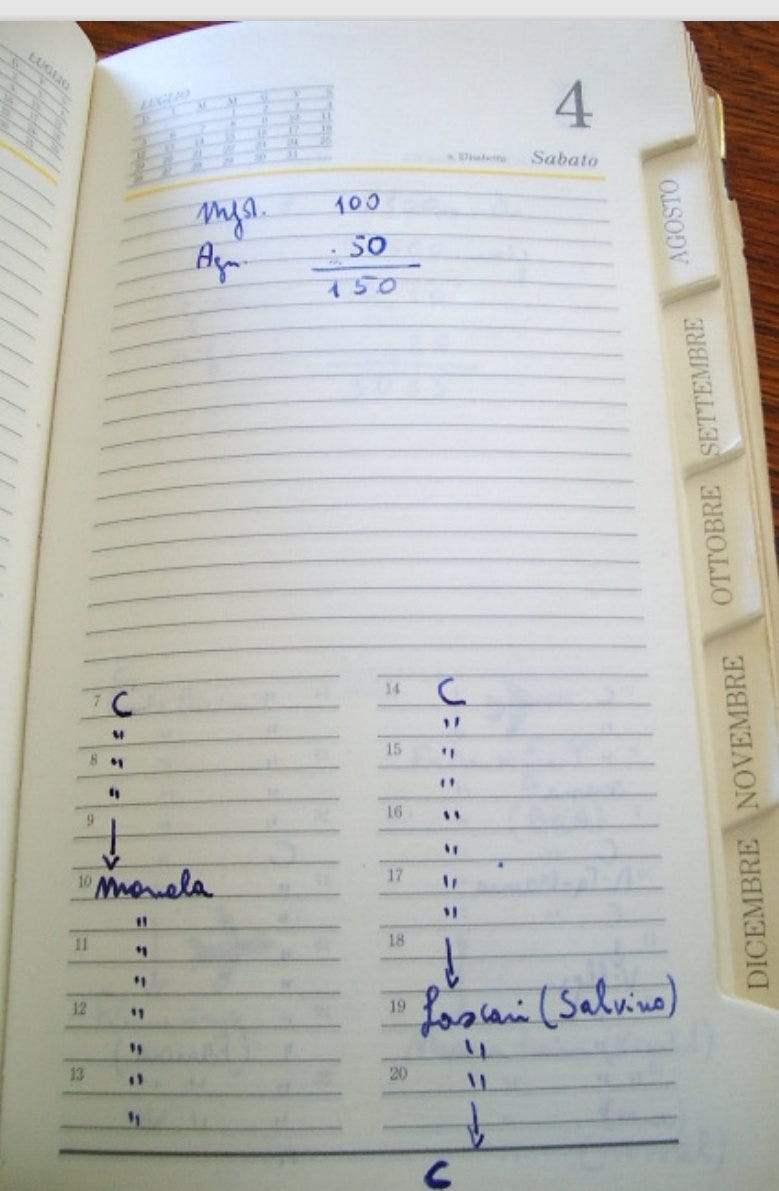
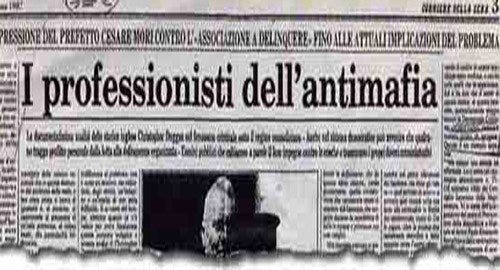
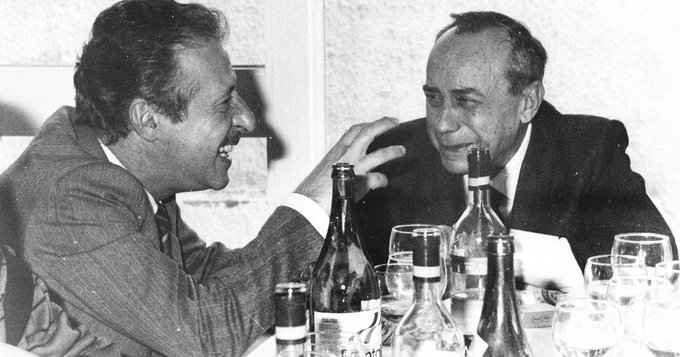
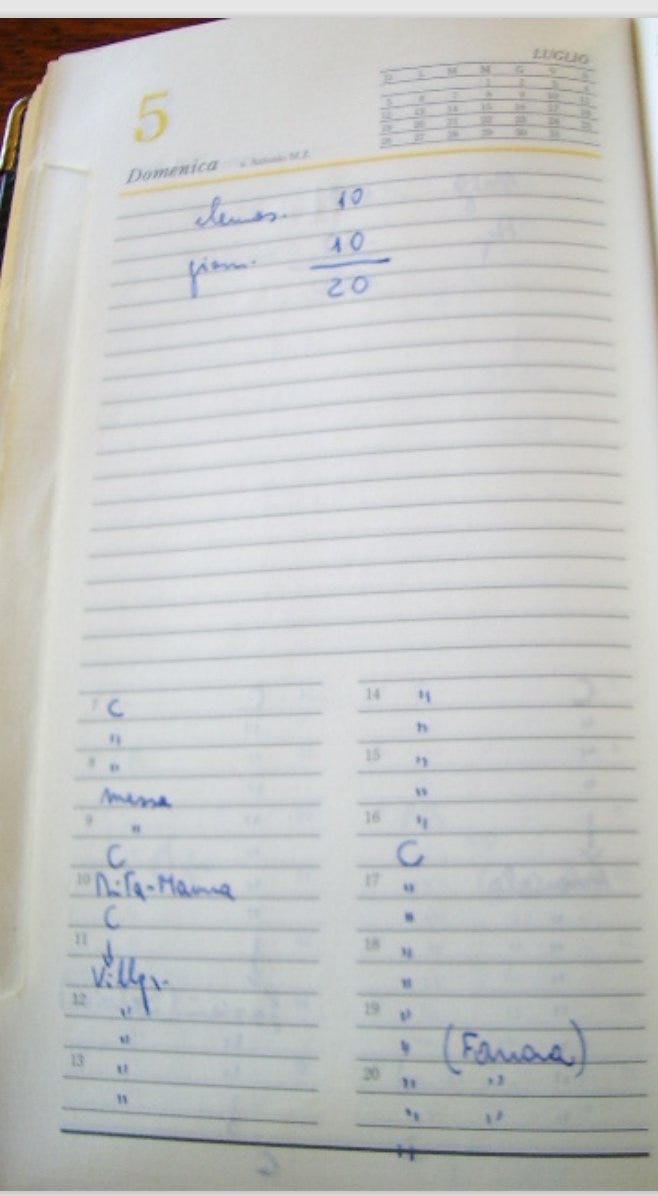
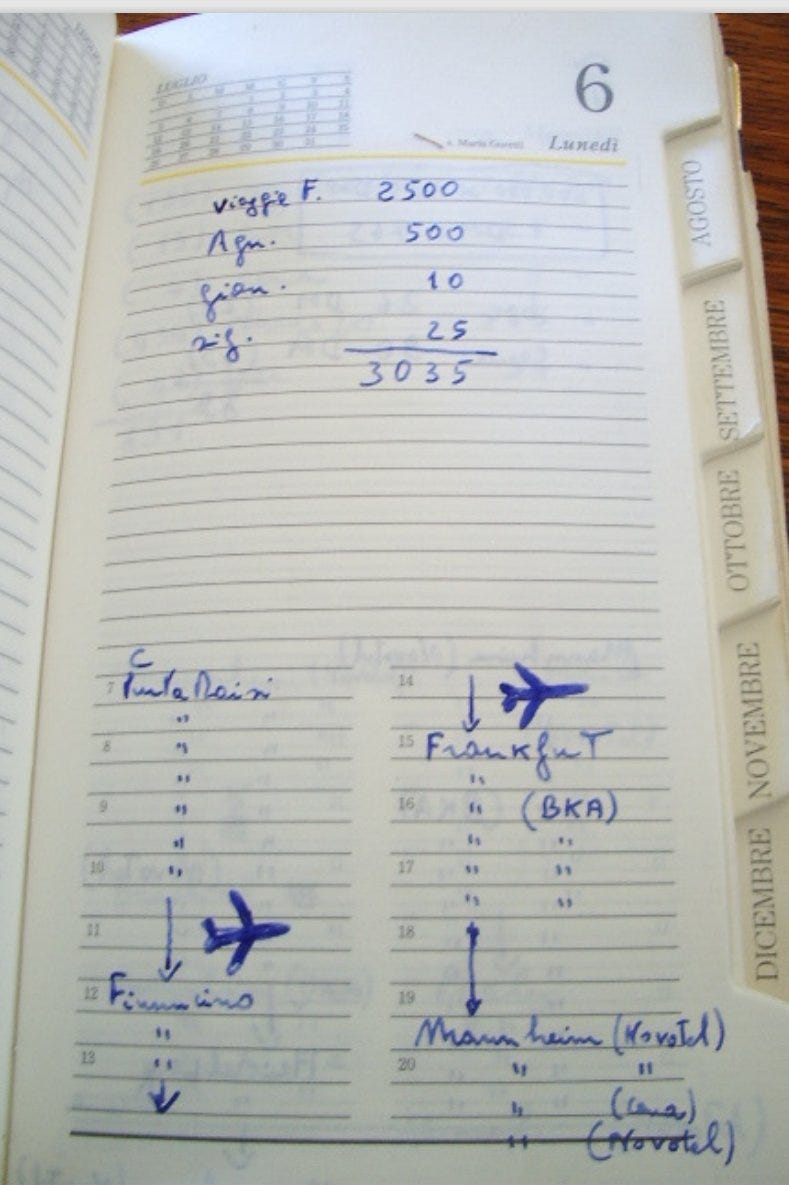
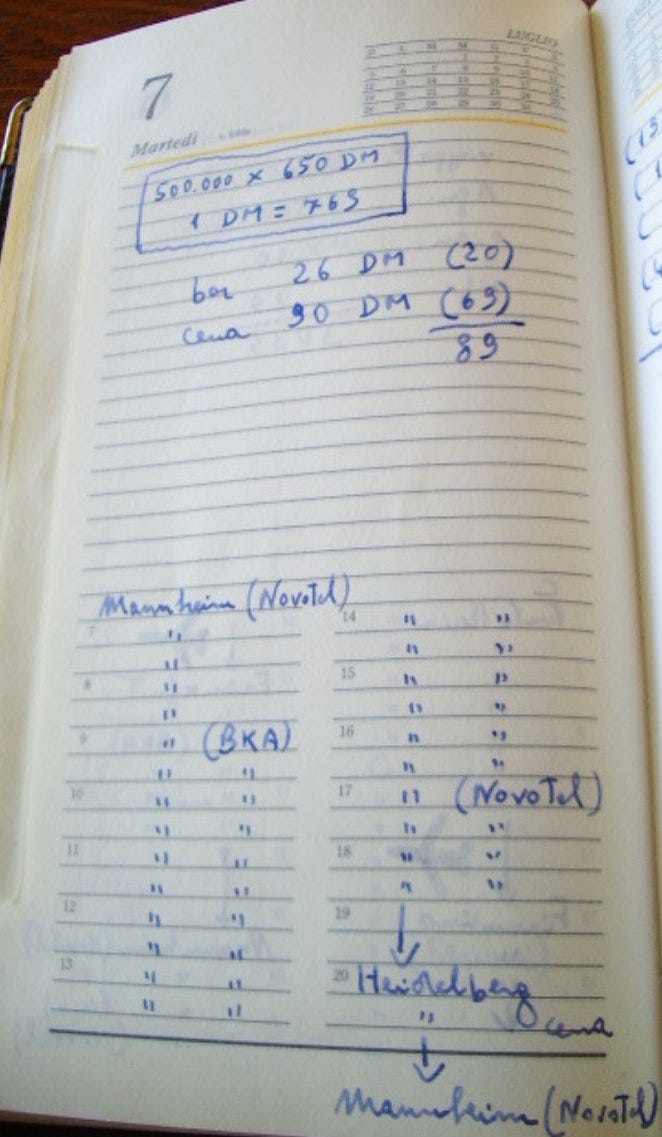
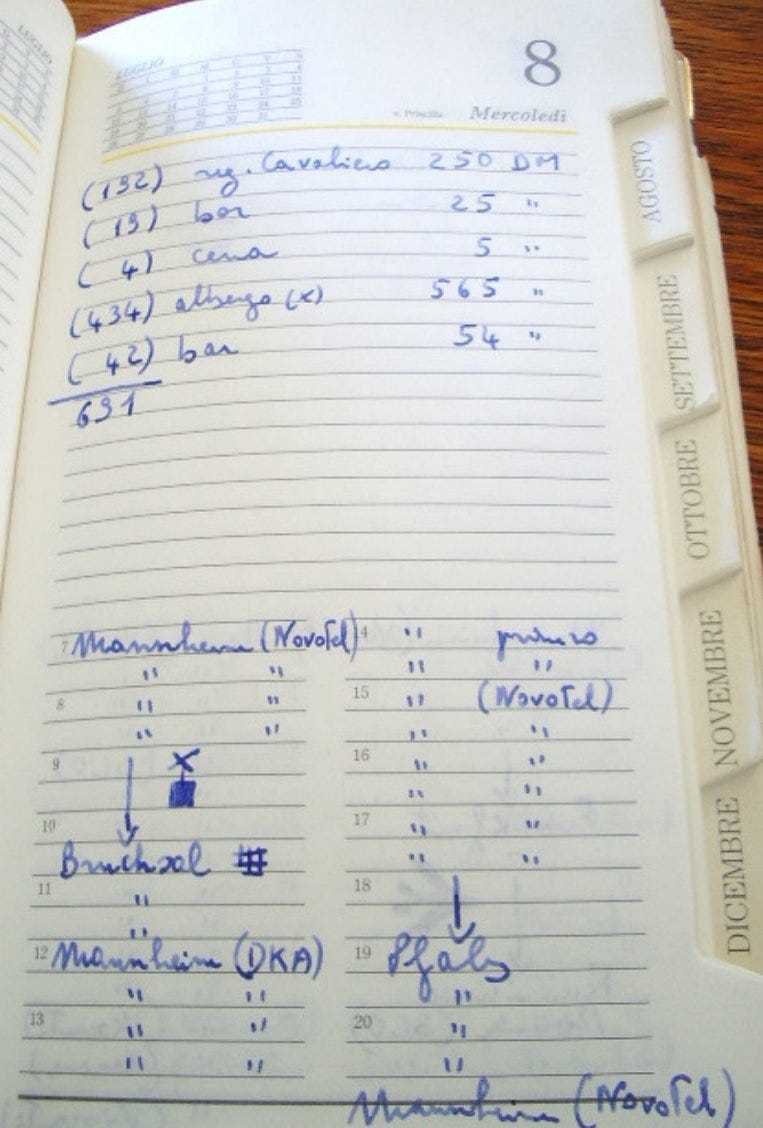
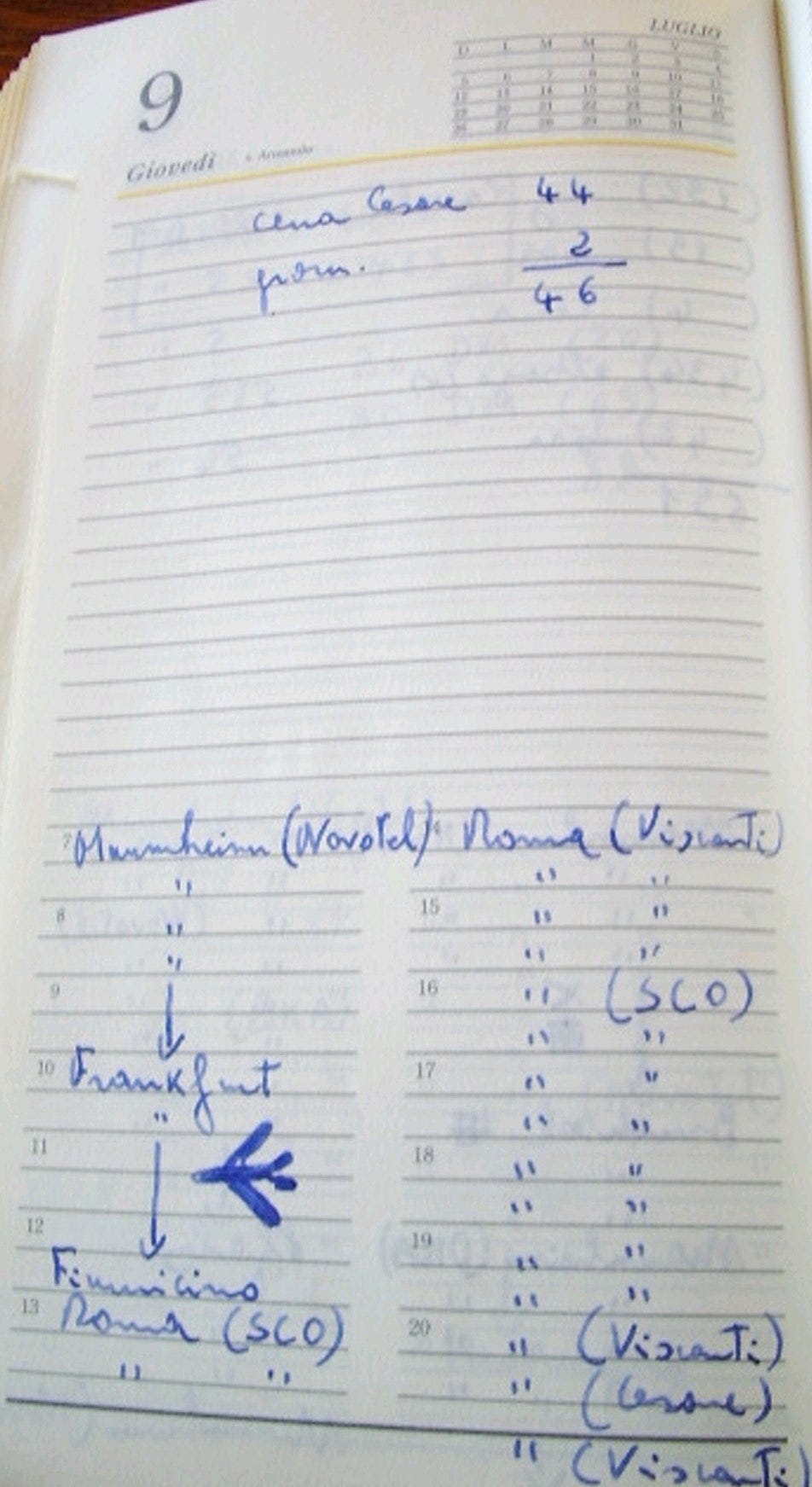
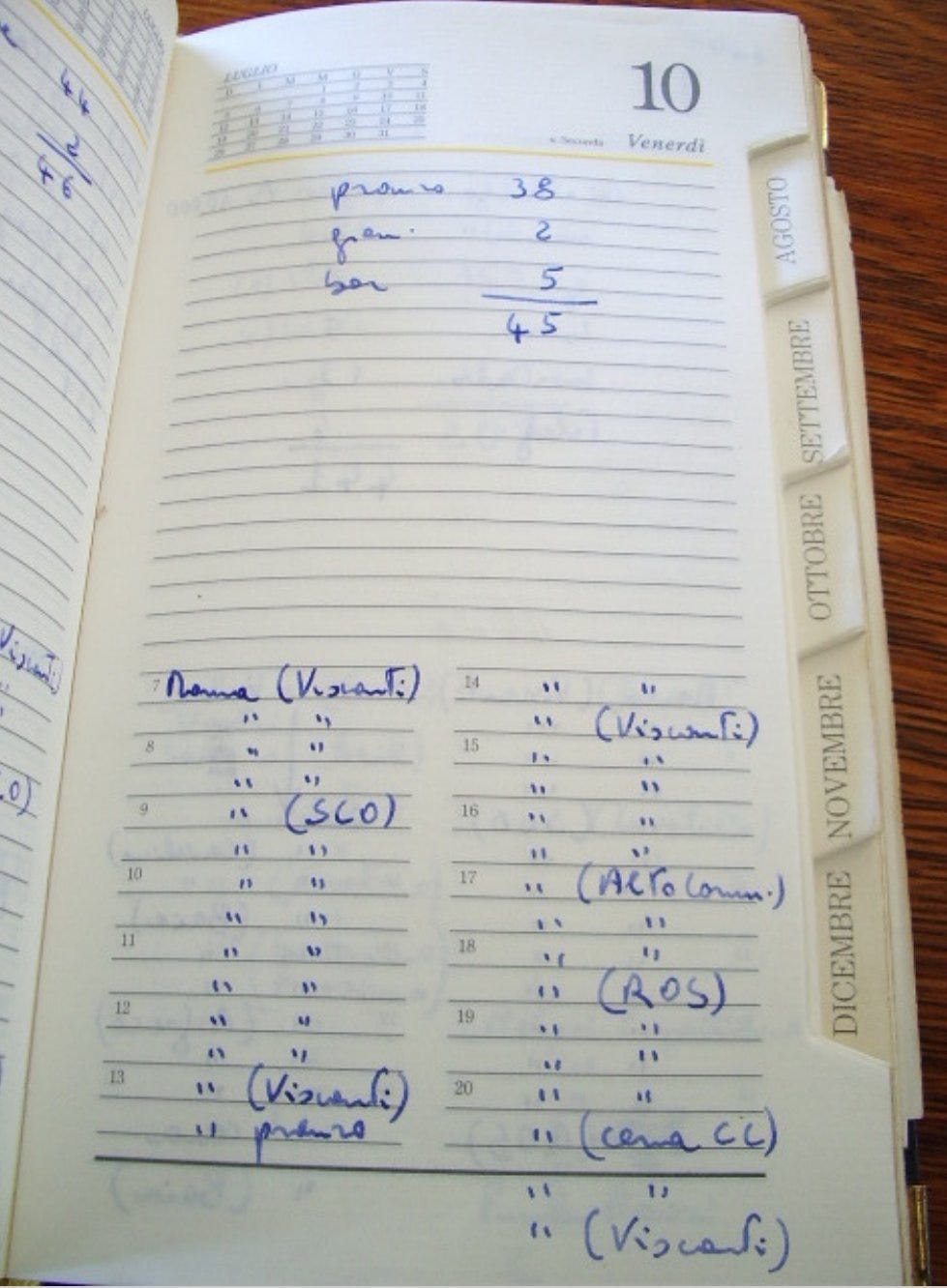
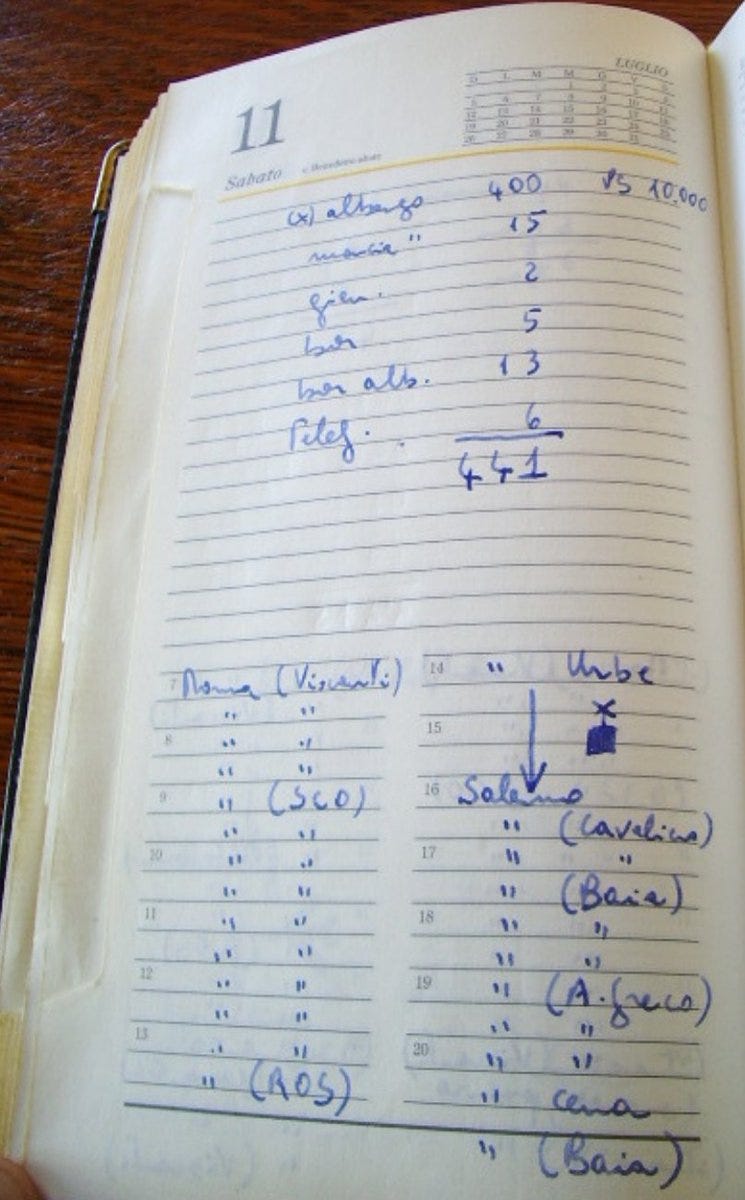
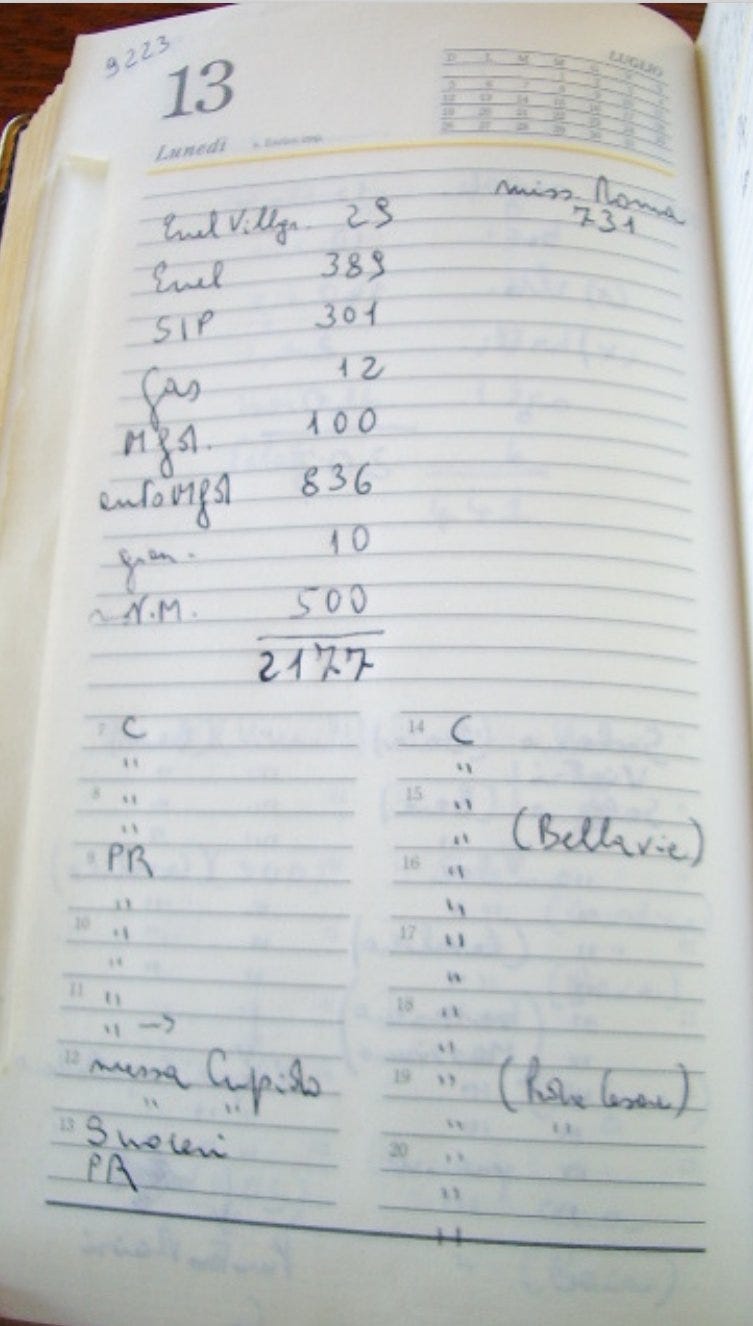
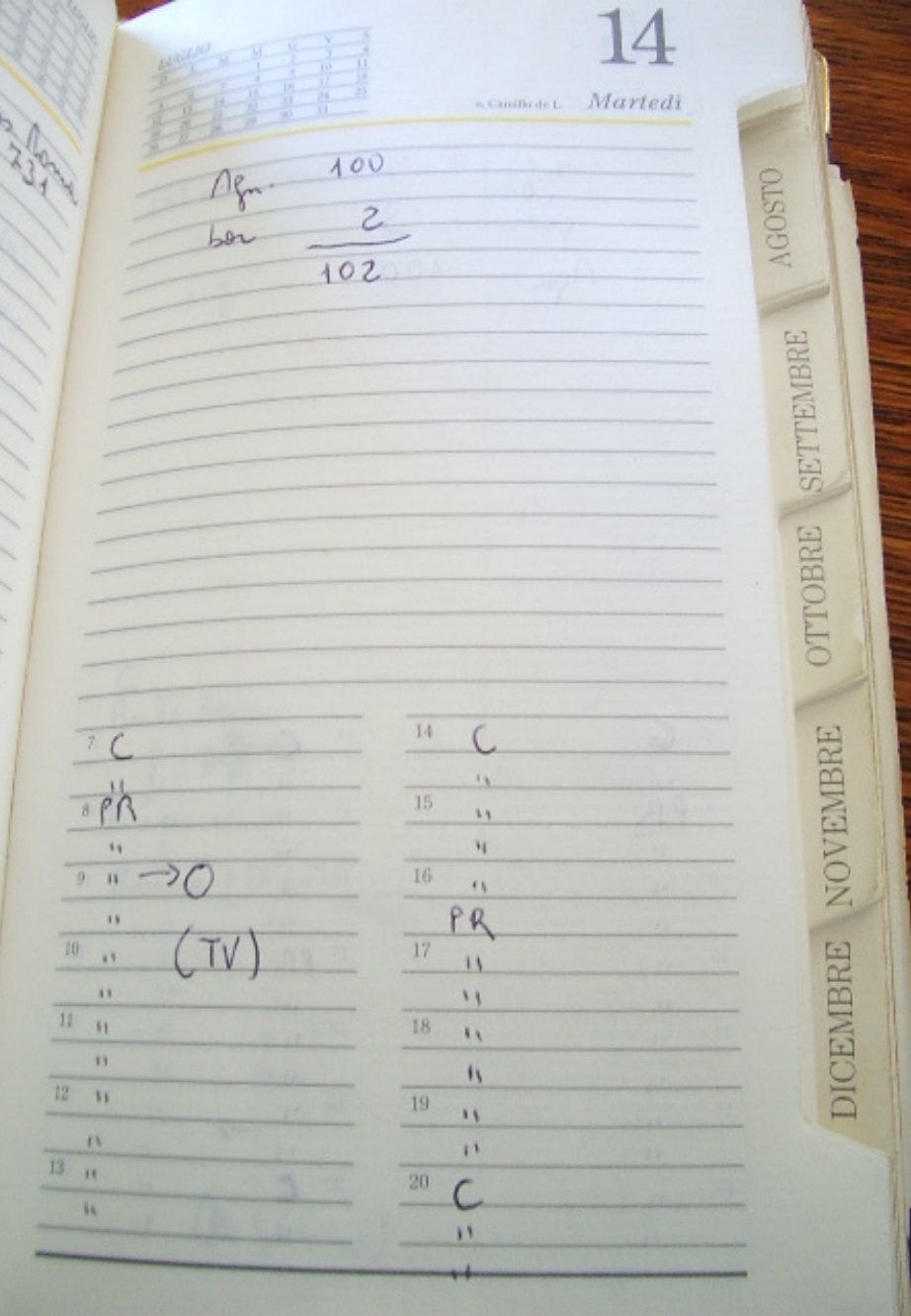
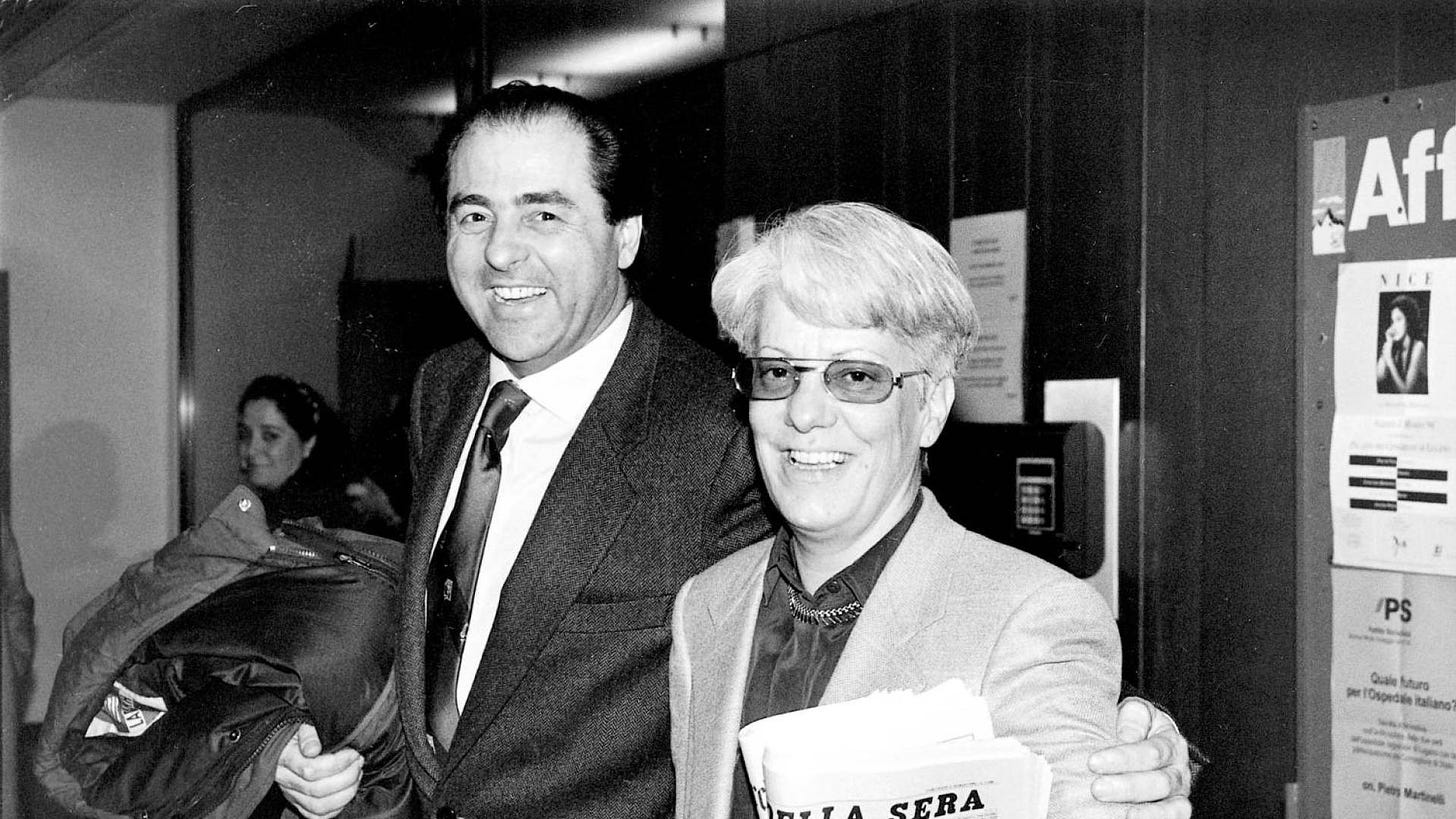
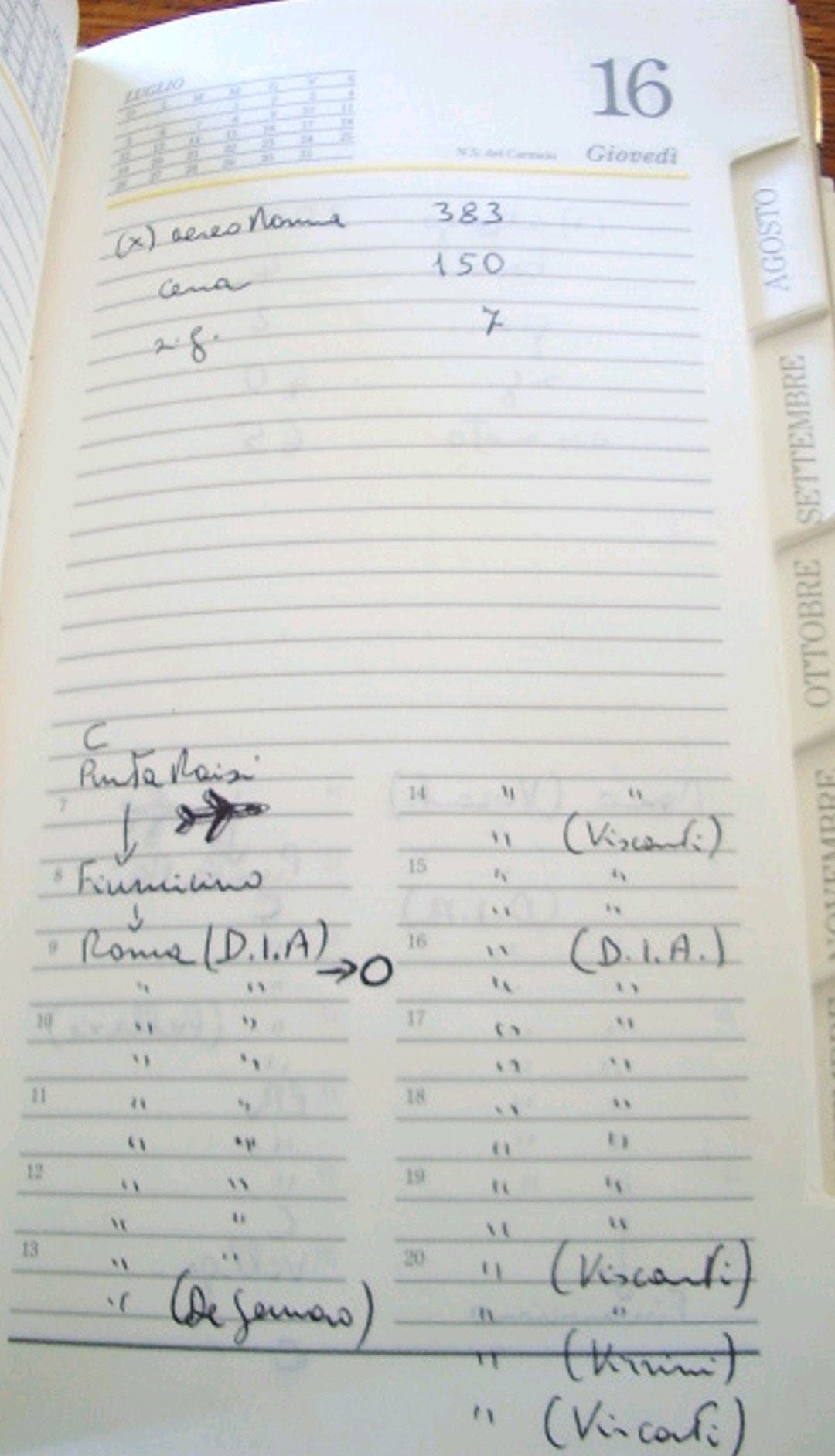
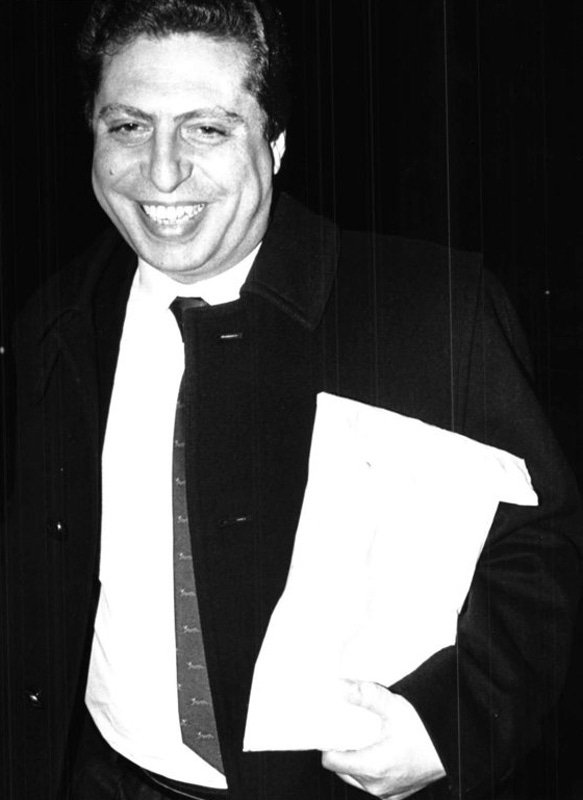
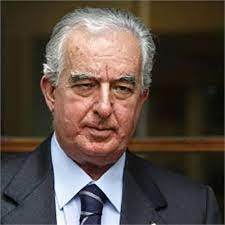
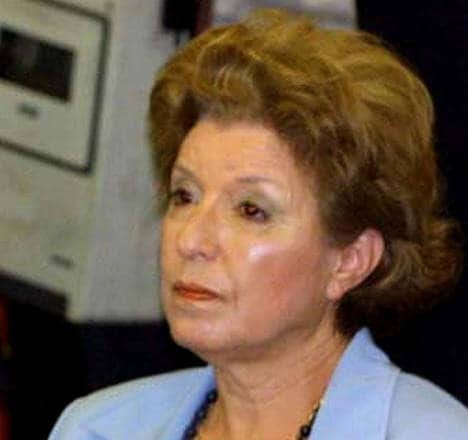
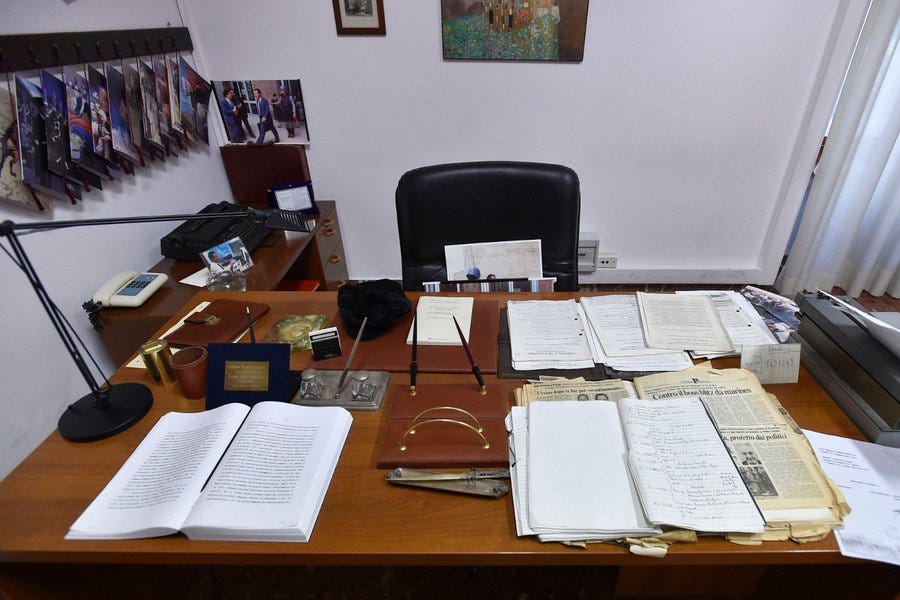
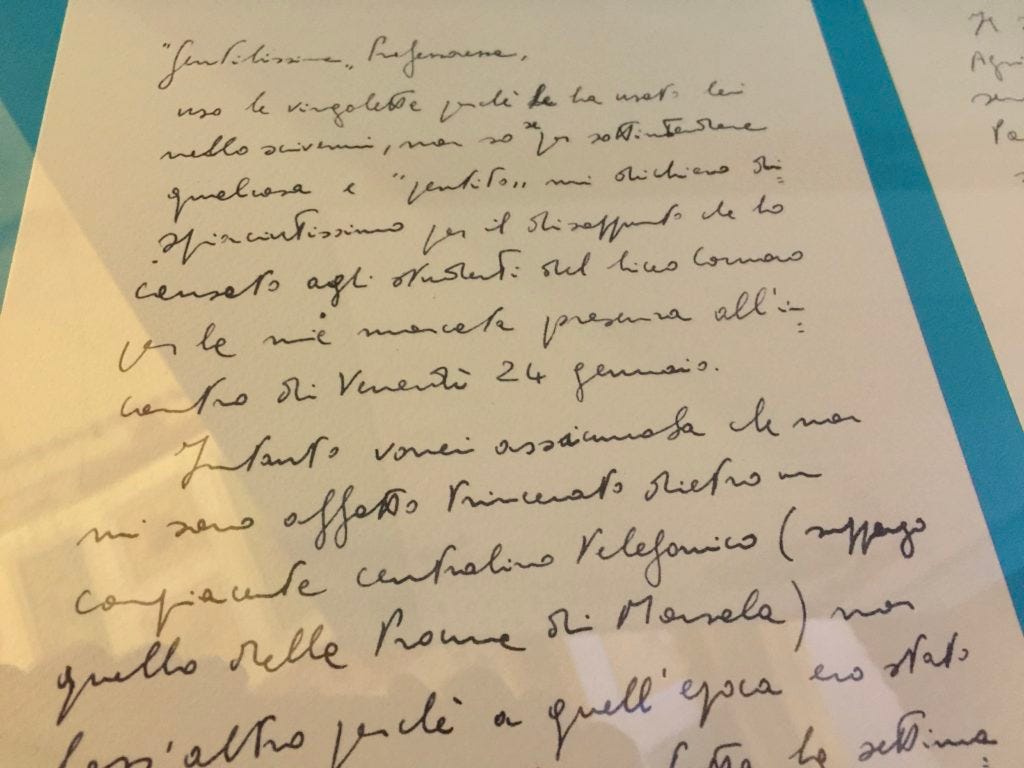
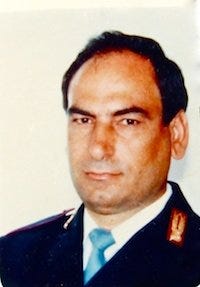
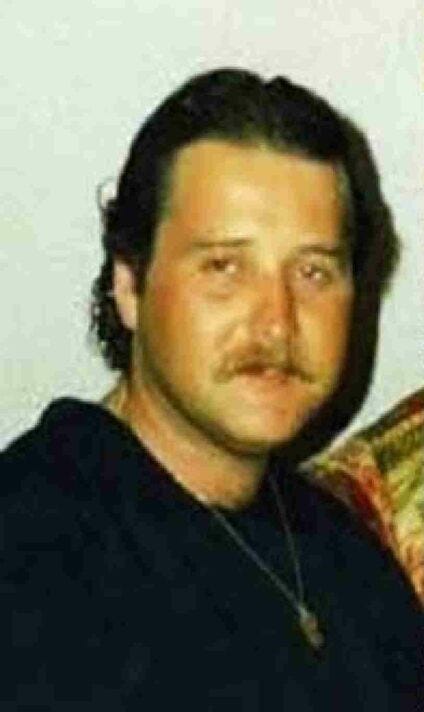
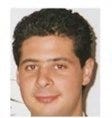
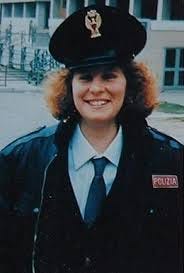
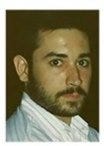
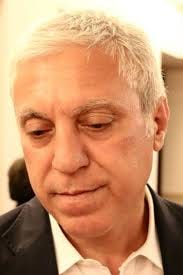
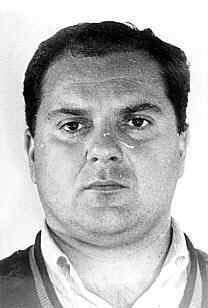
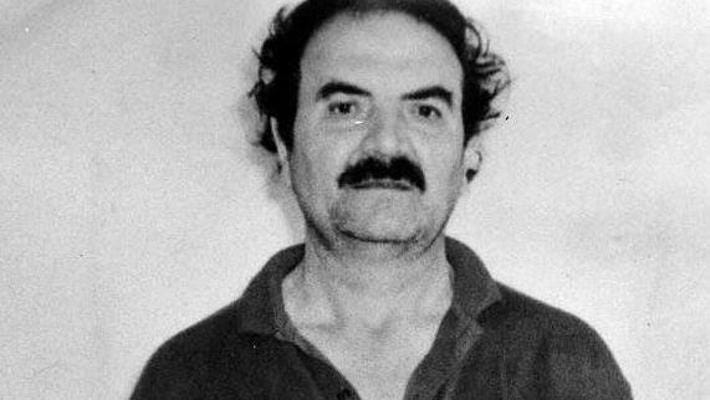
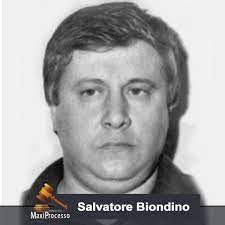
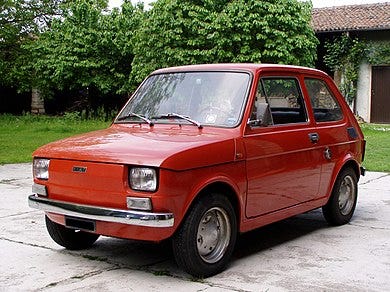
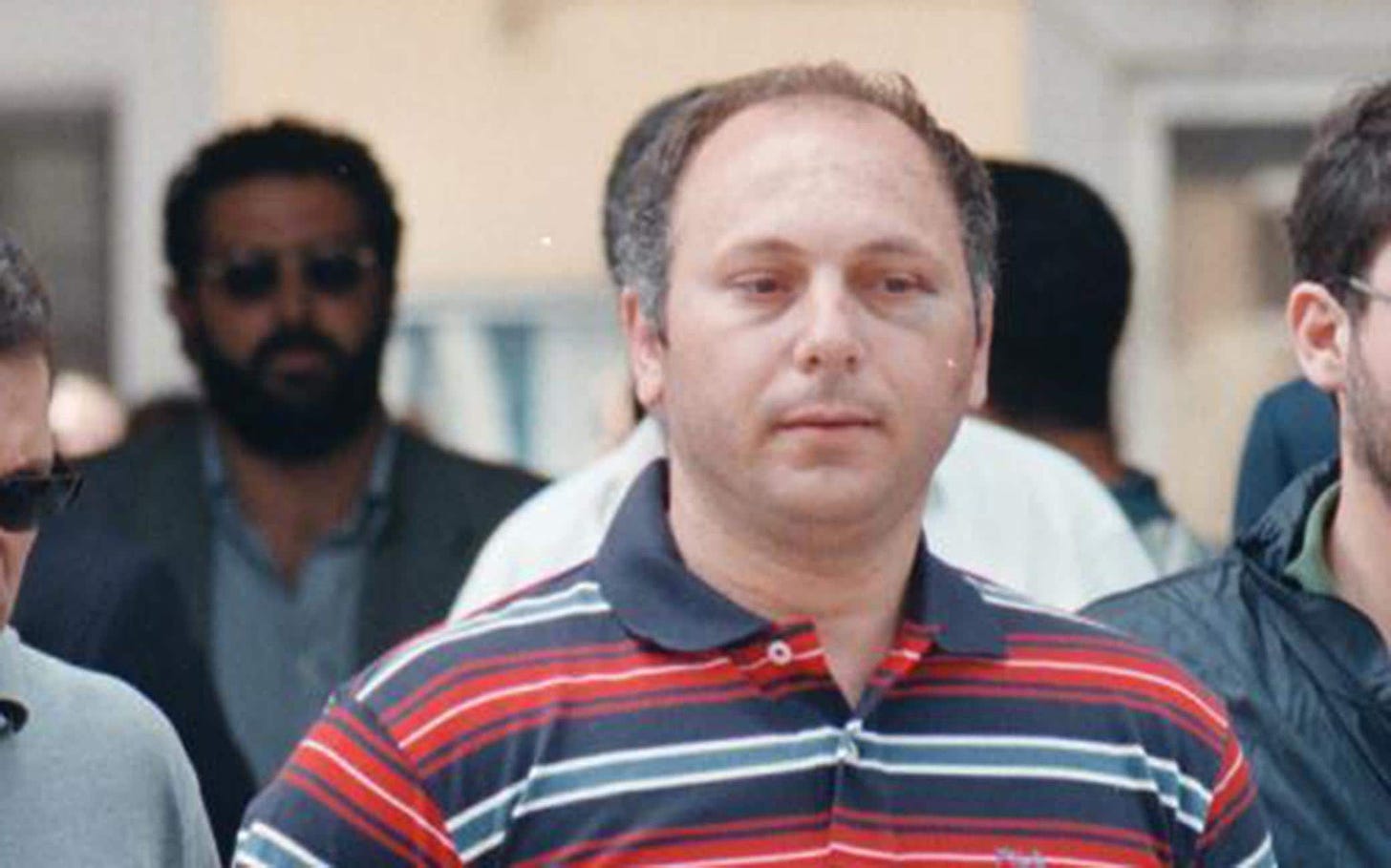
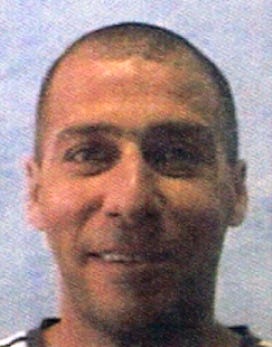
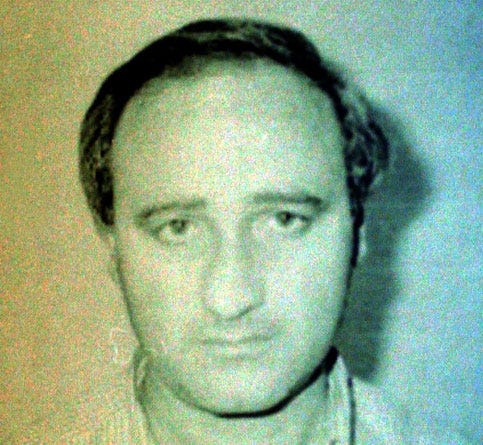
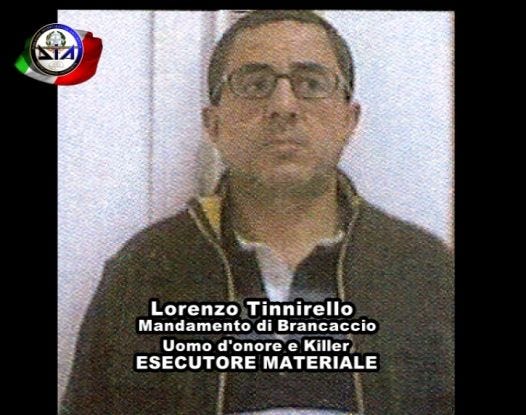
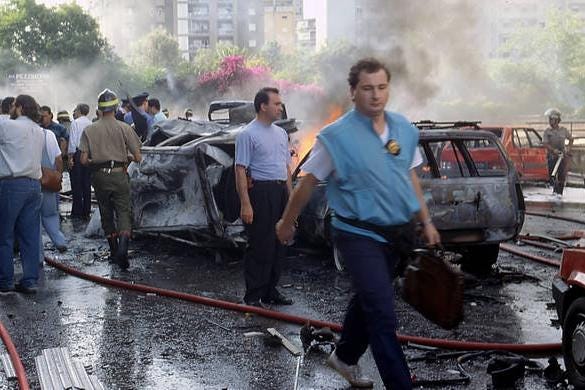
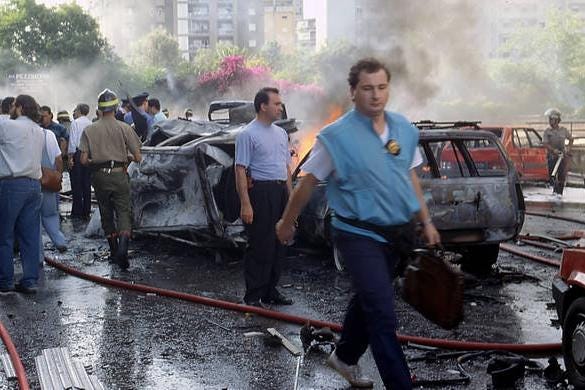
Another superb piece Nicholas. Meticulous reconstruction. Horrifying and very moving.
What a splendid piece of work! Thank you so much!